Tropicana Cookies FF Cannabis Strain Week-by-Week Guide
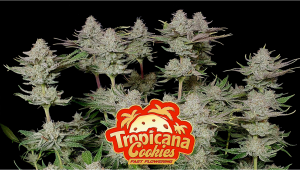
- 1. Grow specification
- 2. Grow set up
- 3. Germination and seedling stage | week 1
- 4. Early veg | week 2
- 5. Mid veg | weeks 3-6
- 6. Transition (pre-flower) | week 7
- 7. Early flower | weeks 8-9
- 8. Mid flower (bulk phase) | weeks 10-11
- 9. Ripening and harvest | week 12 (and beyond)
- 10. The outcome
- 10. a. Tropicana cookies ff yield
- 10. b. Tropicana cookies ff smoke report
- 11. In conclusion
Tropicana Cookies FF is a grower's dream, thriving indoors and outdoors with minimal upkeep. Boasting vibrant purple flowers and a robust structure, it offers simple and straightforward cultivation. The smoke delivers a potent and long-lasting experience, starting with an energizing head rush and transitioning into a deep relaxation. The strain's unique terpene profile, a sugary blend of lemon peels and fresh orange juice, makes it a flavor powerhouse.
In our week-by-week guide, we’ll follow several real-world grow diaries to show you the strain’s timeline and its reaction to different cultivation methods, so that none of the Tropicana Cookies’ huge potential goes to waste and the plant gives you your best harvest ever.
1. Grow Specification
Tropicana Cookies FF is a perfect blend of Sativa (35%) and Indica (65%) genetics, promising a harmonious balance both during cultivation and consumption. With a fast flowering time of 6-7 weeks, it's the express route to your own cannabis haven. The XL size and impressive height of up to 200cm (70-80 inches) ensure a bountiful harvest. Indoors, expect a generous yield of 450-600 gr/m2 (1.5-2 oz/ft2), while outdoor enthusiasts will be delighted with 350-650 gr (12-23 oz) per plant.
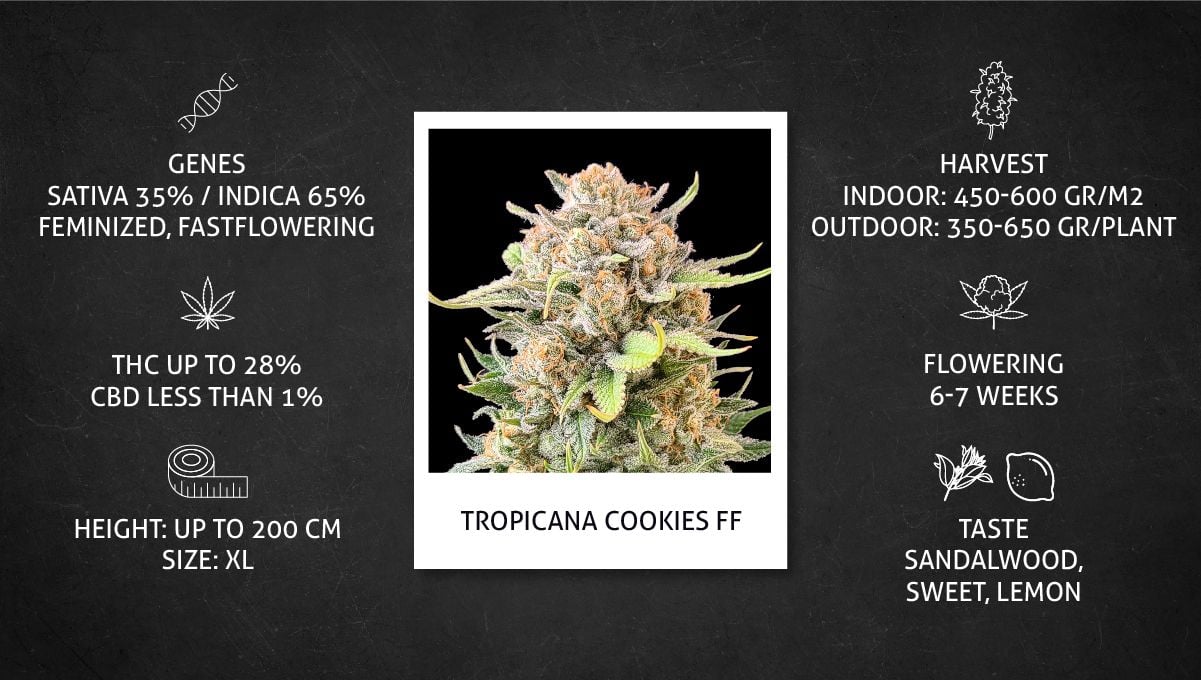
Tropicana Cookies FF doesn't just stop at quantity—it's quality in every bud. Boasting a THC content of up to 28%, it delivers a potent and long-lasting experience. Last but not least, the flavor offers a delightful blend of sandalwood, sweet, and lemon notes that will have your taste buds dancing. Elevate your cultivation game and savor the exceptional with Tropicana Cookies FF—it's more than just a strain; it's an experience waiting to be enjoyed!
2. Grow Set Up
While browsing available Tropicana Cookies FF grow diaries we've come across just one outdoor grow so far, and it doesn't provide us with many insights. It's a shame because this fast-flowering plant is ideal for outdoor cultivation, including less hospitable climates. On the other hand, we understand that most of you will probably grow this variety indoors, and we hope that basing our guide on 4 indoor cycles will be very instructive to you. The table below contains some details of these 4 setups.
| Grow Space | Light | Medium | |
|---|---|---|---|
| A | 0.4 m2 | 650W LED | Coco/Perlite |
| B | 1 m2 | 240W LED | Soil/Perlite |
| C | 0.37 m2 | 240W LED | Bio Bizz Light Mix |
| D | 0.45 m2 | 240W LED | Bio Bizz Light Mix |
If your own setups are nothing like the ones detailed above (or if you plan an outdoor cycle), don't worry: Tropicana Cookies FF is easy to grow, relisient and adaptable to the widest range of conditions. It's likely to flourish in any setup and align its growth patterns with any cultivation method.
3. Germination And Seedling Stage | Week 1
The seed-to-harvest journey of your Tropicana Cookies FF starts with seed germination, and rest assured, the seeds are viable and robust enough to produce vigorous plants under diverse conditions. However, you will increase the chances of trouble-free cultivation and a generous final result if you create mild warm and humid conditions for your seedlings and young plants right from the start. In the table below, the temperatures are the closest to ideal in A and B, while the relative humidity is optimal in A.
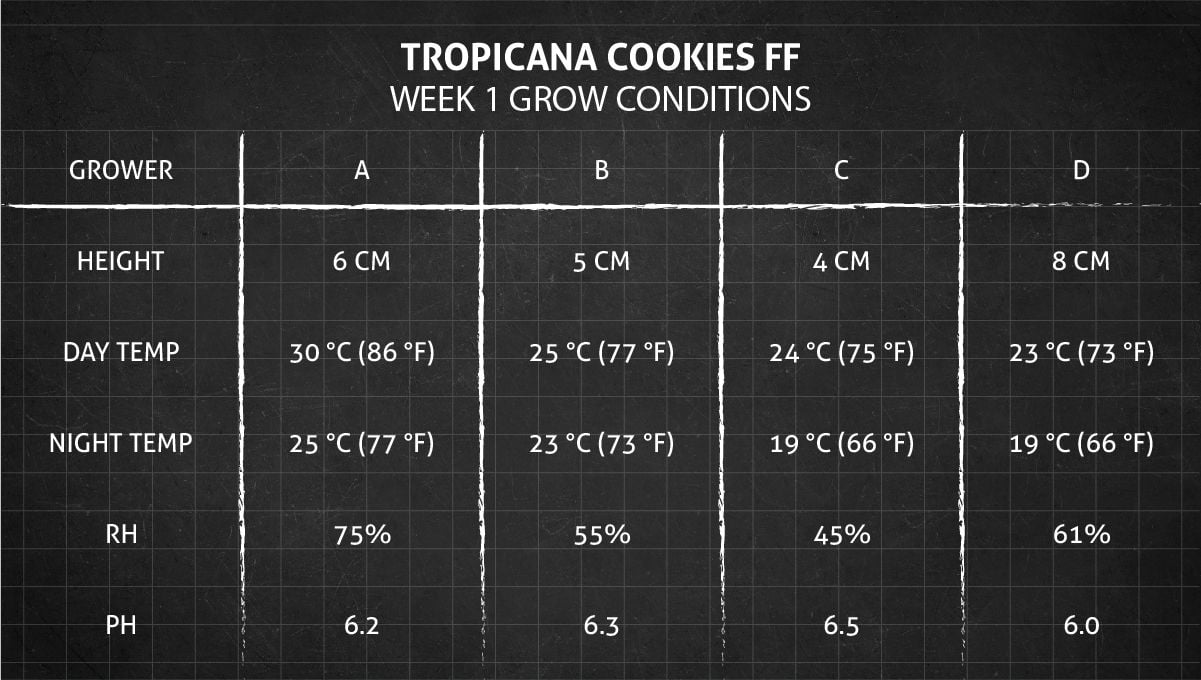
First things first, when you get those seeds from reputable breeders such as Fast Buds, know that they're good to go. Germination doesn't have to be rocket science. Drop the seed into a glass of water, let it chill there for up to 12 hours. This gets enough moisture inside for the embryo to wake up. Then, it's wet paper towel time until you see that little taproot saying hello.
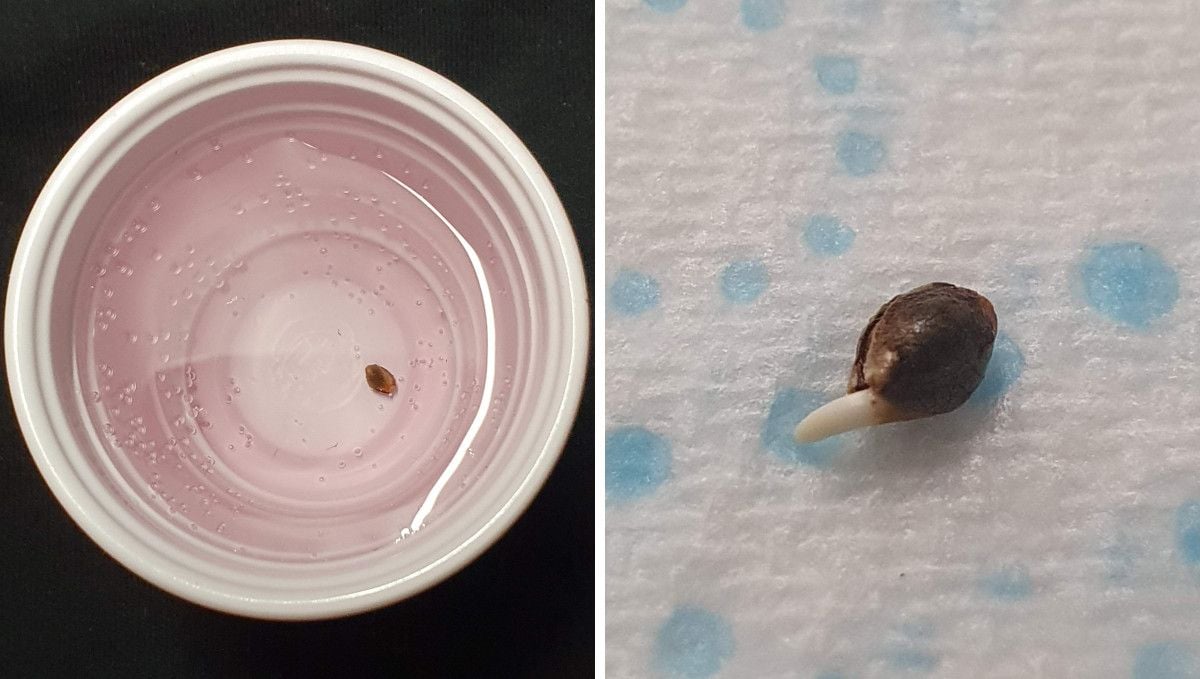
Hold your horses before planting right away. The seedling's A-game happens when the taproot reaches about half an inch, or 1 cm, between wet paper towels.
Plant the sprout, with its taproot facing downward, about a quarter-inch (0.5 cm) deep, cover it in moist medium, and keep things damp until you spot the sprout. This ensures a smooth emergence without wrestling with the seed shell.
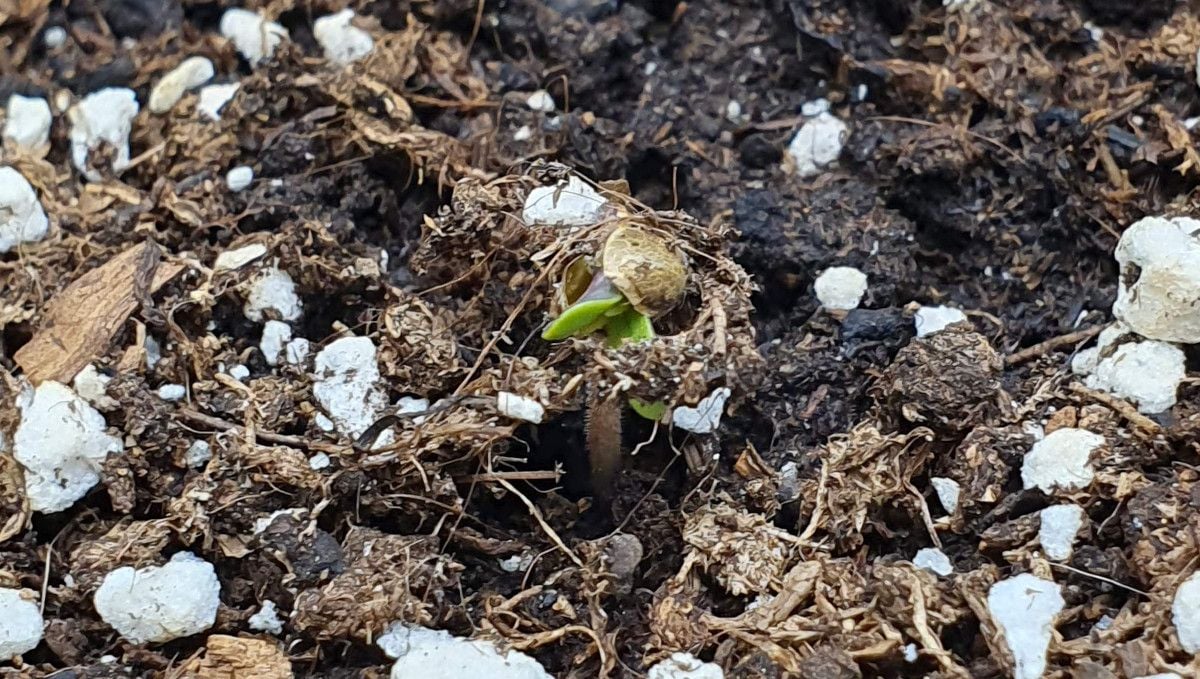
As soon as your green buddy breaks through, it's showtime for the grow light – at least 18 hours a day is the way to go. Pay attention to the light's distance, type, and wattage. We're aiming for that sweet spot: not too intense to shock, but enough to keep the seedling compact (under 3 inches). If it stretches too much, no worries – a DIY support system can fix that bendy situation.
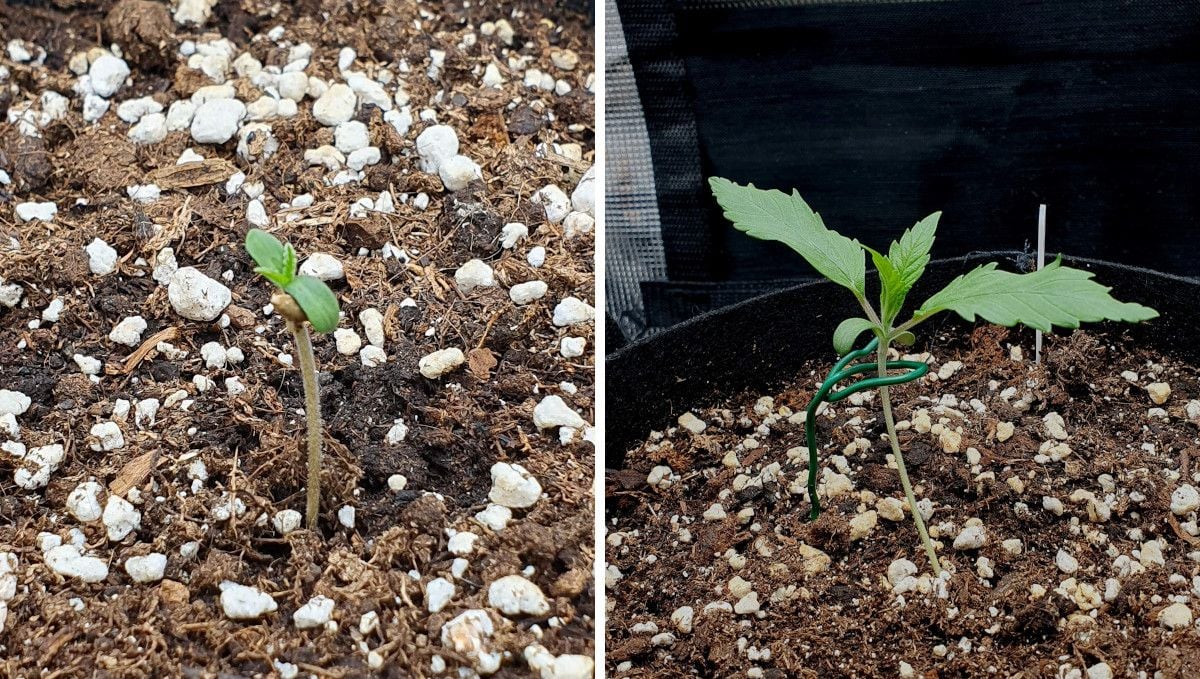
Decide early if you want to start in smaller containers (even solo cups) before transplanting or in final pots from day one. It's a trade-off – easier watering with the first approach, but going straight to final containers from day one skips the repotting risks.
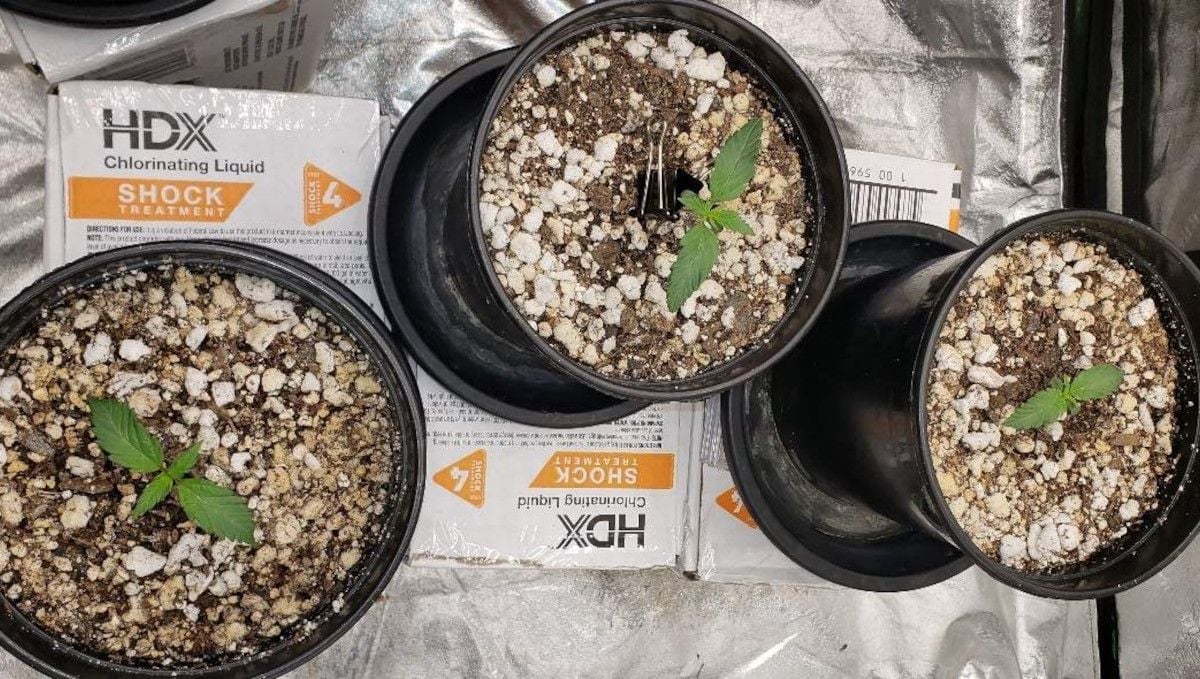
For soil growers, we suggest taking it easy on the feeding frenzy. Young seedlings feed on what's stored inside initially, then graduate to soil nutrients. Hold off on fertilizers – those young roots need a gentle start. Now, if you're in the inert medium gang (rockwool or coco coir), introduce a bit of plant food from day one to keep your green pals satisfied.
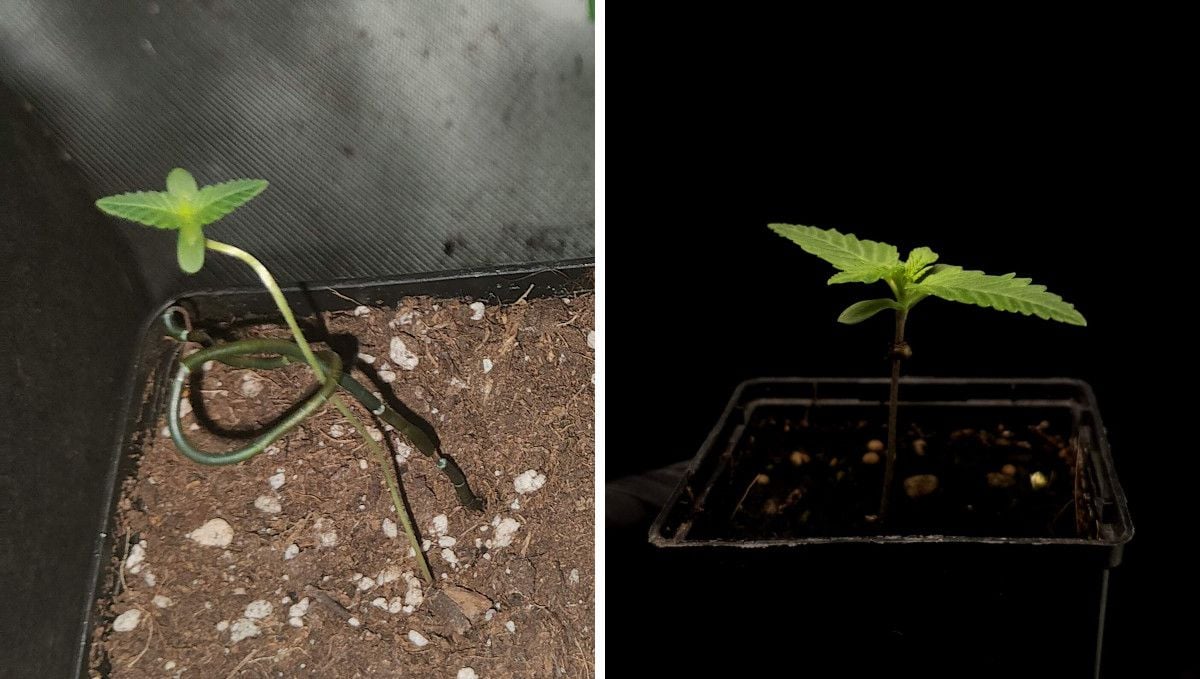
4. Early Veg | Week 2
In week 2, your plant (being still small and vulnerable) will be thankful if you manage to keep the same mild conditions as before – with day temperature at around 26°C and a relative humidity within 70-80%. The temperature drop at night shouldn't be very sharp either, with 5° being just right.
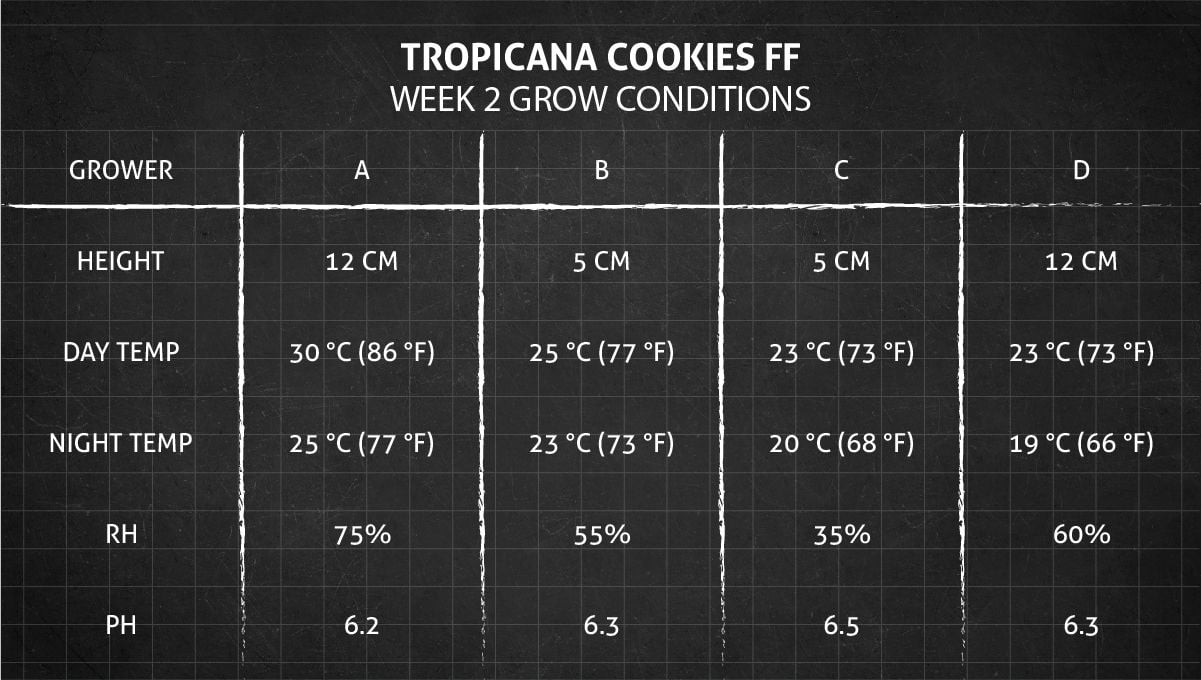
The second week of growing your Tropicana Cookies Fast Flowering brings a subtle shift from the underground hustle of week one. Don't be fooled by seemingly slow progress – the real action's been brewing beneath the surface in the root zone. Now, get ready for the magic above ground.
In week two, you'll witness the start of rapid growth. New fan leaves steal the spotlight, and keep an eye out for some secondary growth at the nodes, hinting at future side branches in the making.
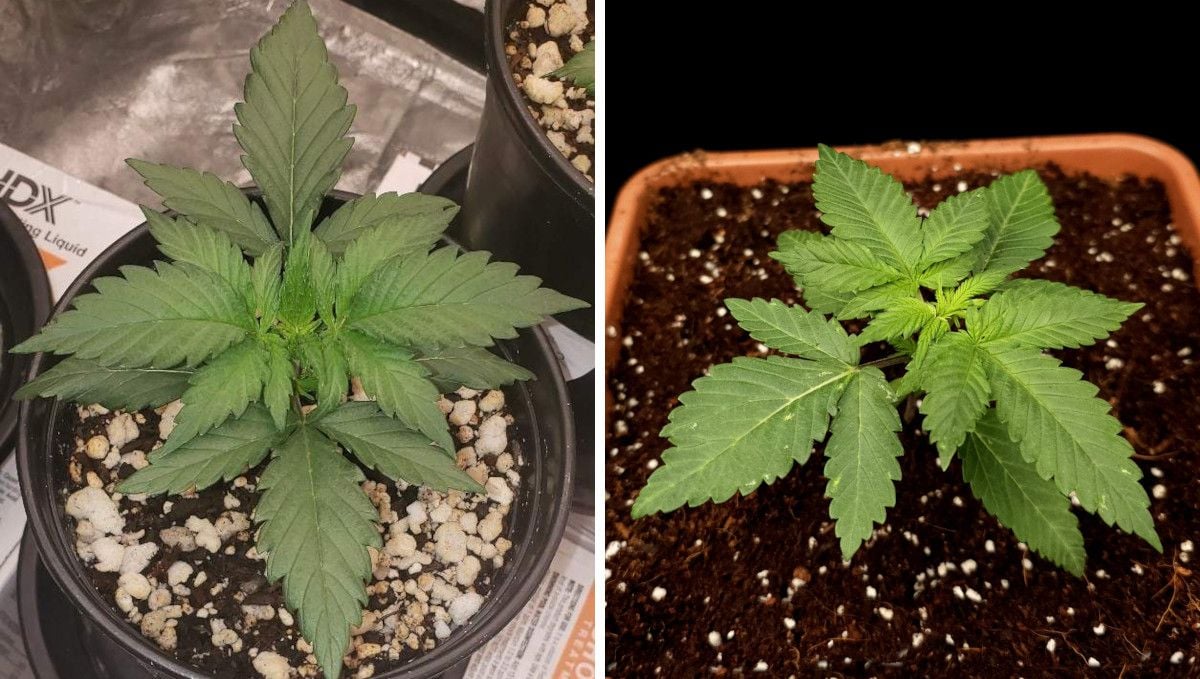
Now, onto some strategic moves. Consider transplanting your young champs into more spacious containers. Why? To give those roots room to roam and lay the groundwork for explosive growth that's just around the corner. Opt for containers with breathable walls like grow bags or airpots – your roots will thank you later with a bountiful harvest.
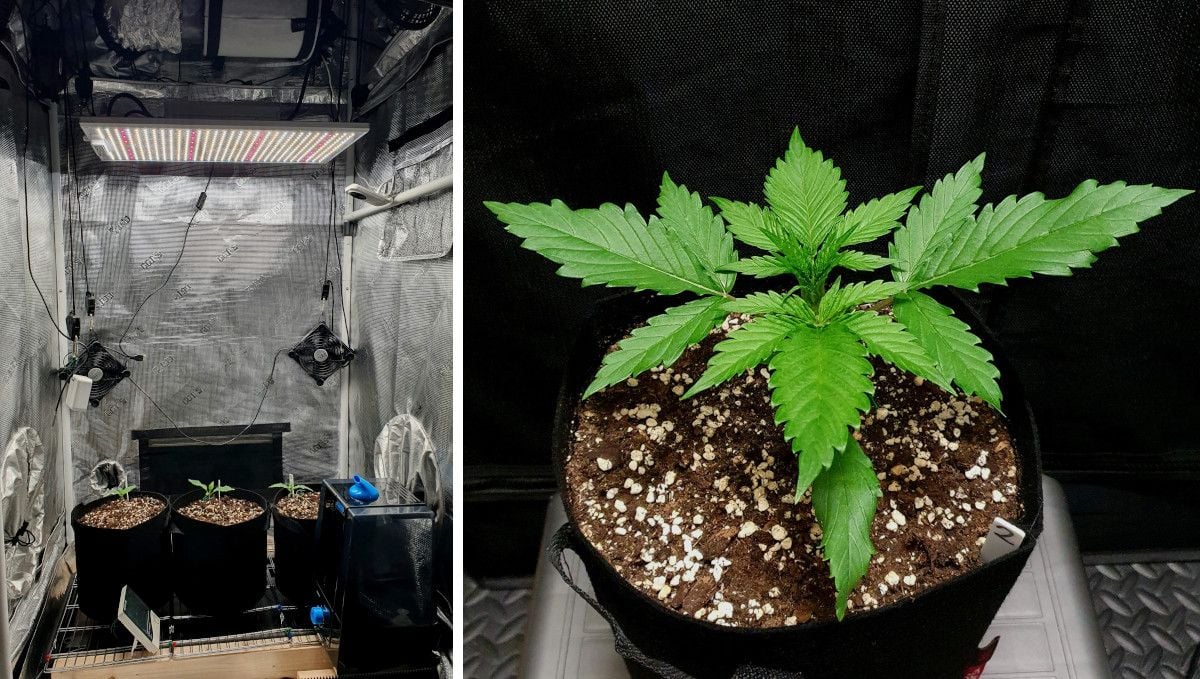
Breathable containers aren't the only secret weapon – timing is crucial too. Depending on your pot size, hold off on the nutrient boost; the container probably packs enough food for now. When growing autoflowers in sizable pots, you might skip extra feeding all the way to flowering. Some pros even swear by "super soil" – a mix that demands only pure water throughout the cycle. Photoperiod plants, though, usually have longer veg and might run out of nutrients in its later stages.
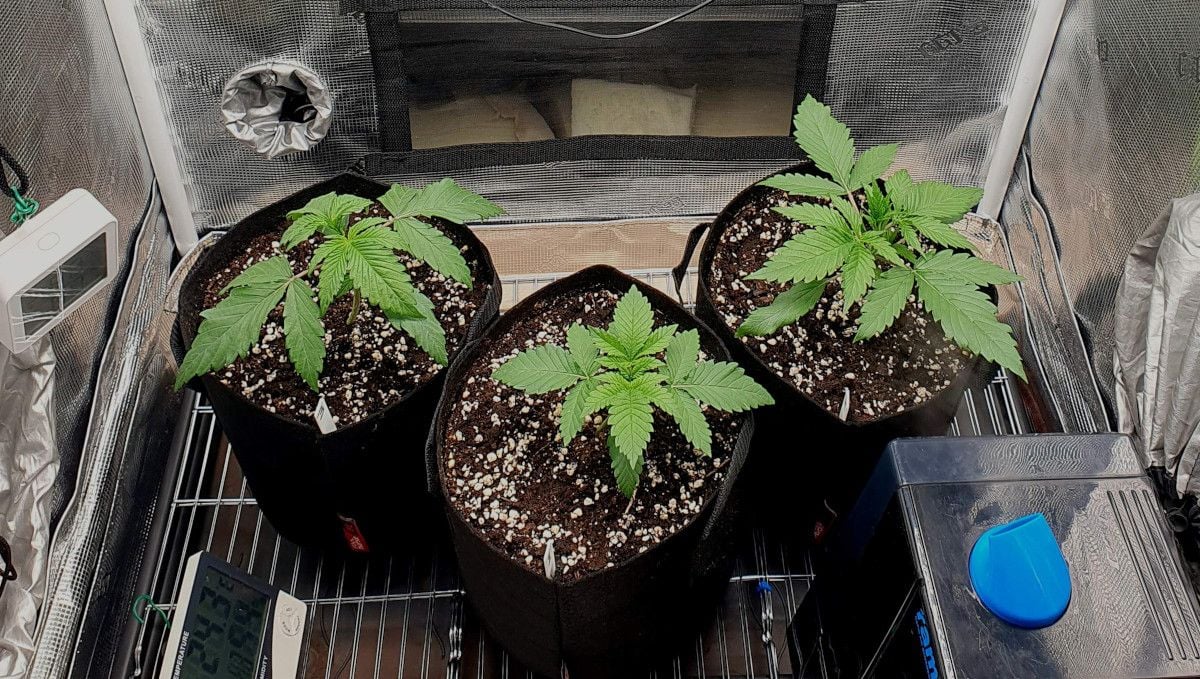
5. Mid Veg | Weeks 3-6
When your young plant overcomes its growing pains and begins its rapid vegetative growth, you may slightly lower both the temperatures and the RH. Aim at 60% humidity for the best results, while day temperature should hover around 25°C.
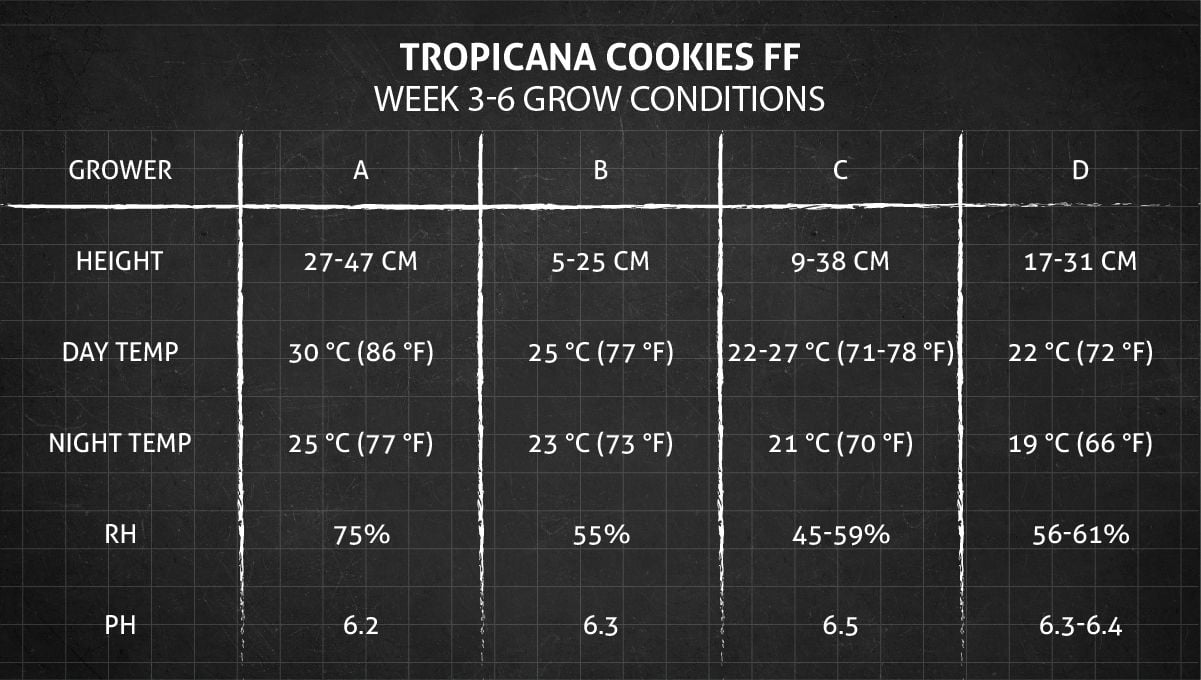
As your Tropicana Cookies Fast Flowering enters the vegetative stage, get ready for a visual spectacle. The once solitary stalk and a few fan leaves transform into a vibrant bush with the rapid growth of side branches – a small, dense marvel in the making.
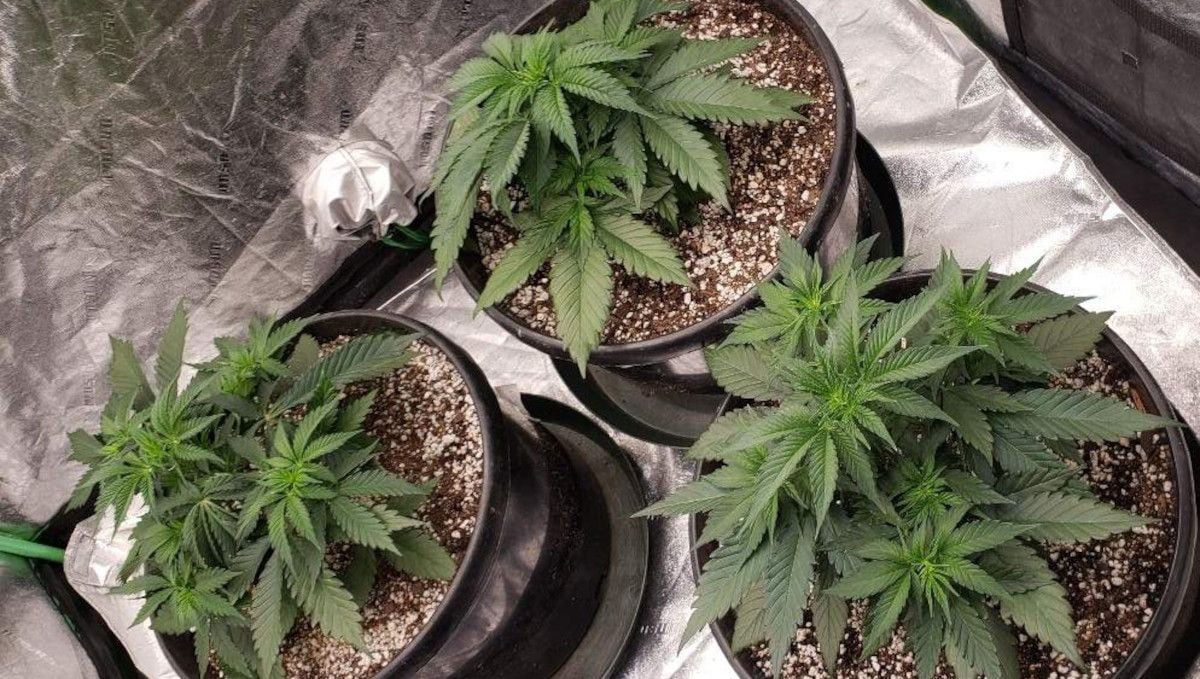
Bushy strains like Tropicana Cookies FF, known for their natural lushness, often evolve into dense multi-branch canopies. This trait is a boon for indoor setups, especially when vertical space is a precious commodity.

To fuel this explosive growth, meet the plant's nutrient demands. Gradually increase the dosage, starting from the minimum and reaching the full amount recommended by the manufacturer. Alternating between nutrient-rich feeding solutions and pure water can provide the optimal support, with nitrogen-rich products being the go-to choice.
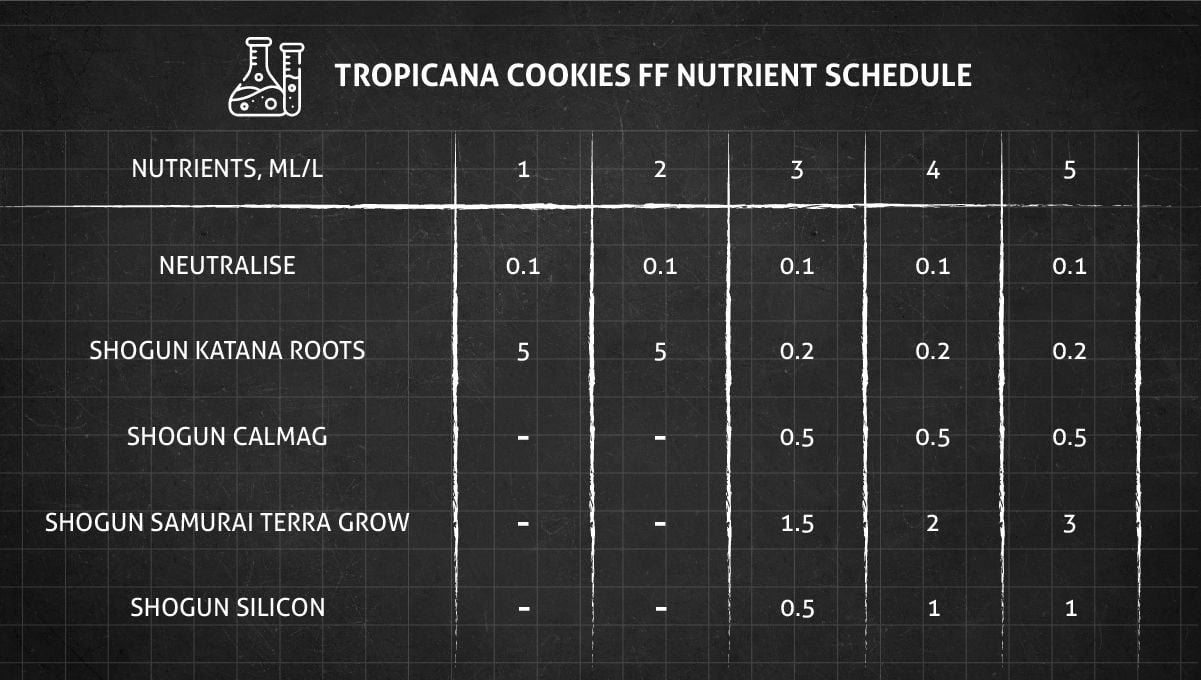
Managing the distance between your top buds and the grow light is crucial for indoor cultivation. Employ various training techniques, such as topping. By snipping the main stem's growing point, you redirect the plant's energy to produce many uniform colas in terms of size, texture, and overall quality.
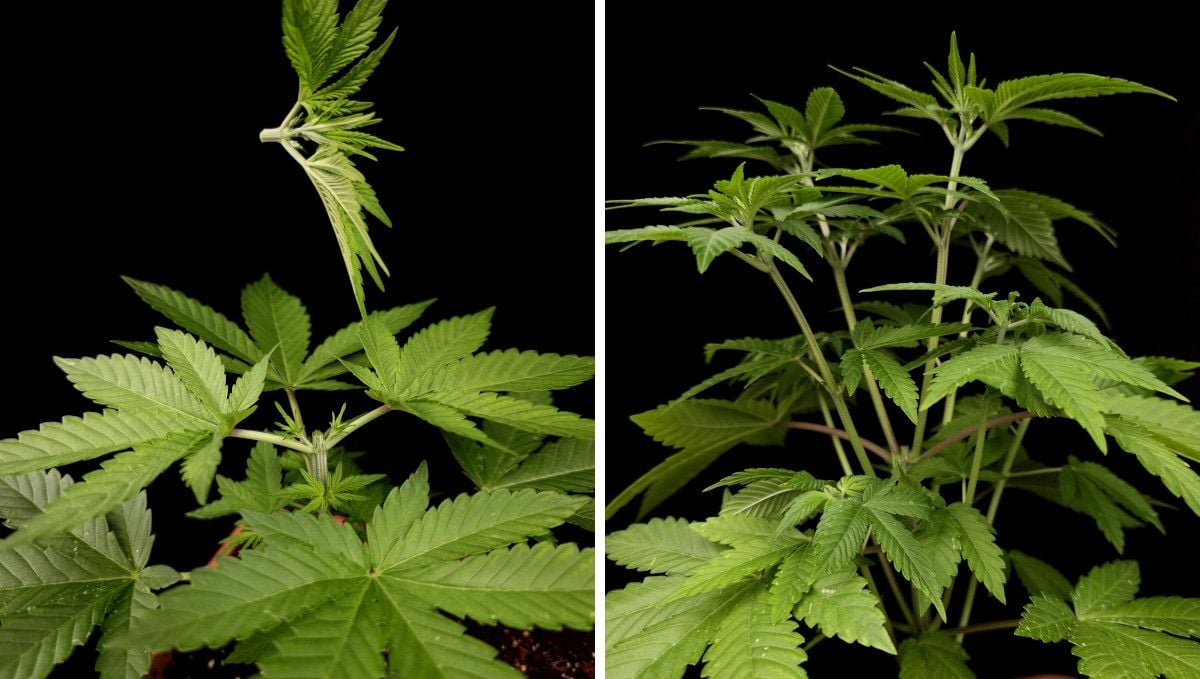
For photoperiodic varieties, such as Tropicana Cookies, the vegetative stage can be extended almost indefinitely. However, beware of letting the plant veg for too long, risking insufficient vertical space for flowering.
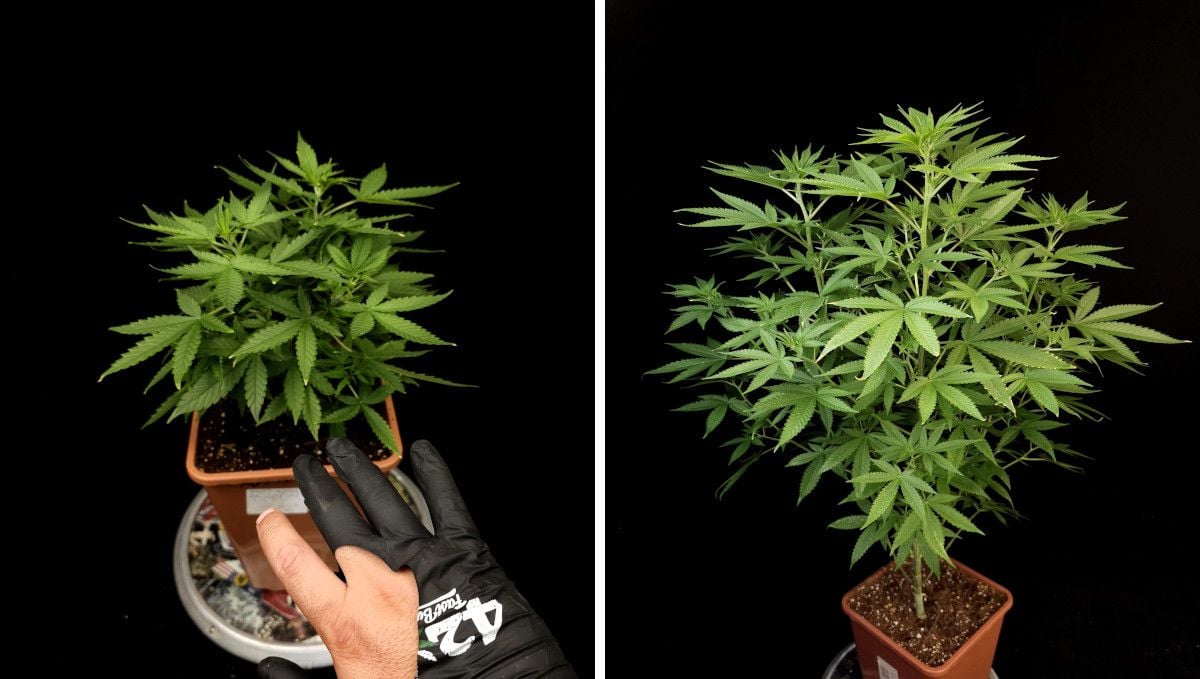
Topping itself doesn't significantly control height but excels in making the plant bushier. For a low-profile canopy, consider low-stress training, with ScrOG (Screen of Green) being a potent variant.
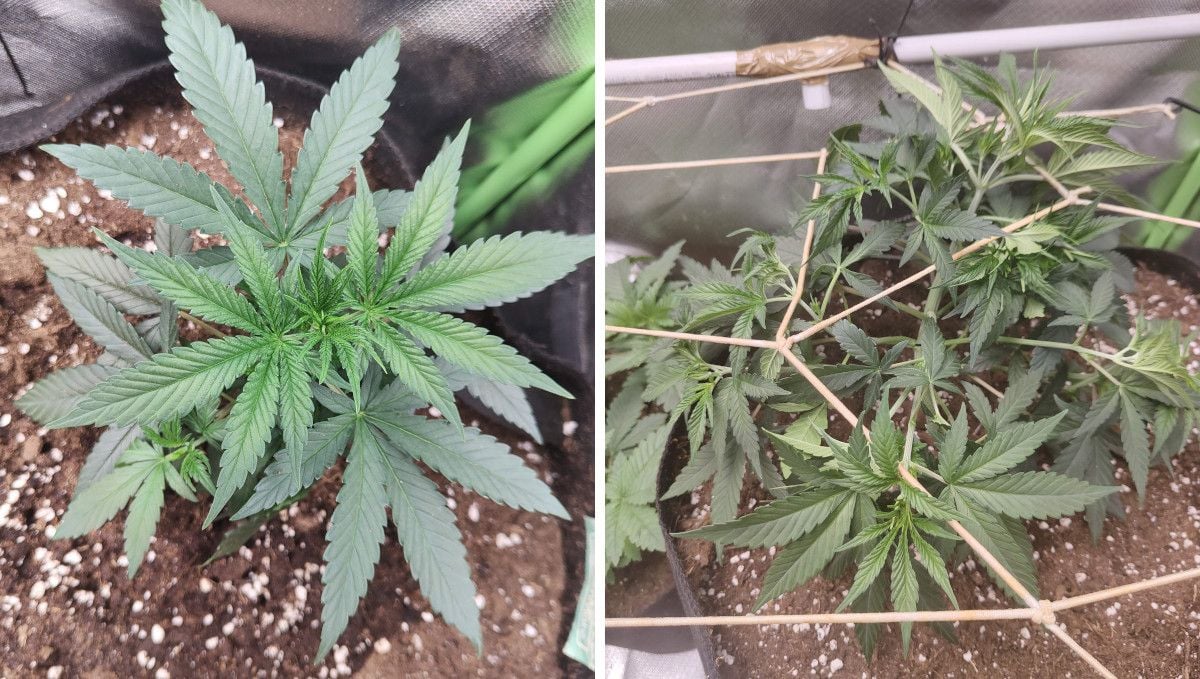
In ScrOG, guide each growing shoot rising above the net outward, filling the mesh. When the mesh is nearly full, it's time to switch to a 12/12 light cycle.
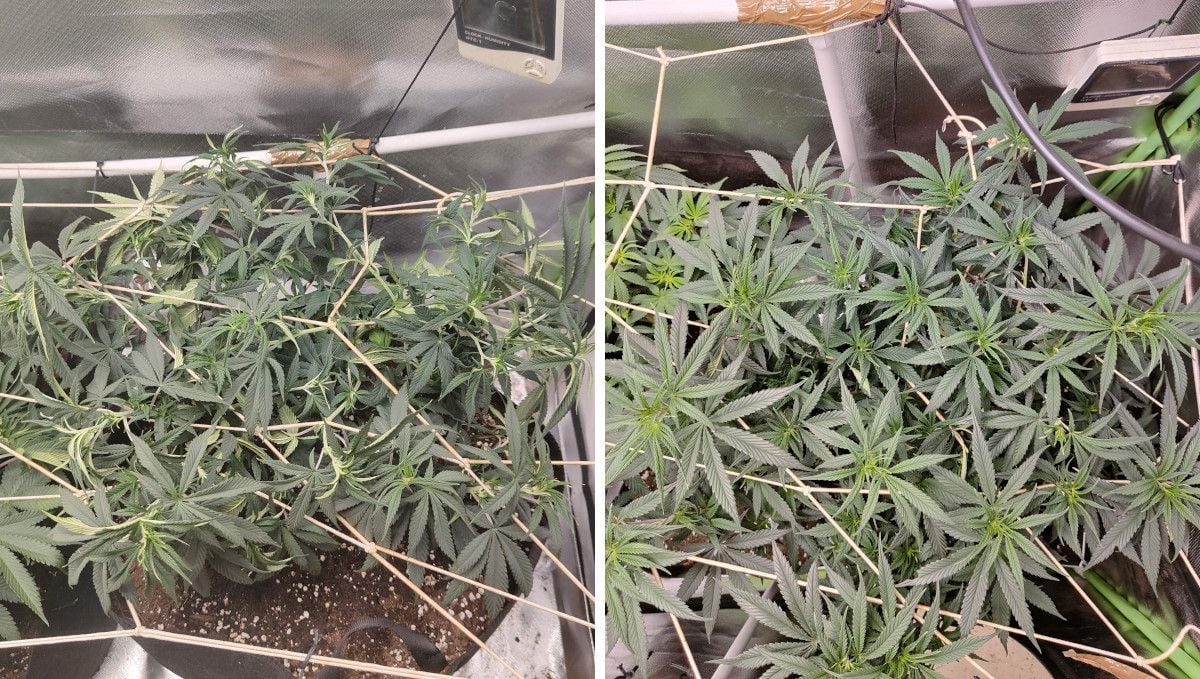
Another technique, FIM (Fuck, I Missed), involves cutting through the top growing point, promoting dense bushy growth.
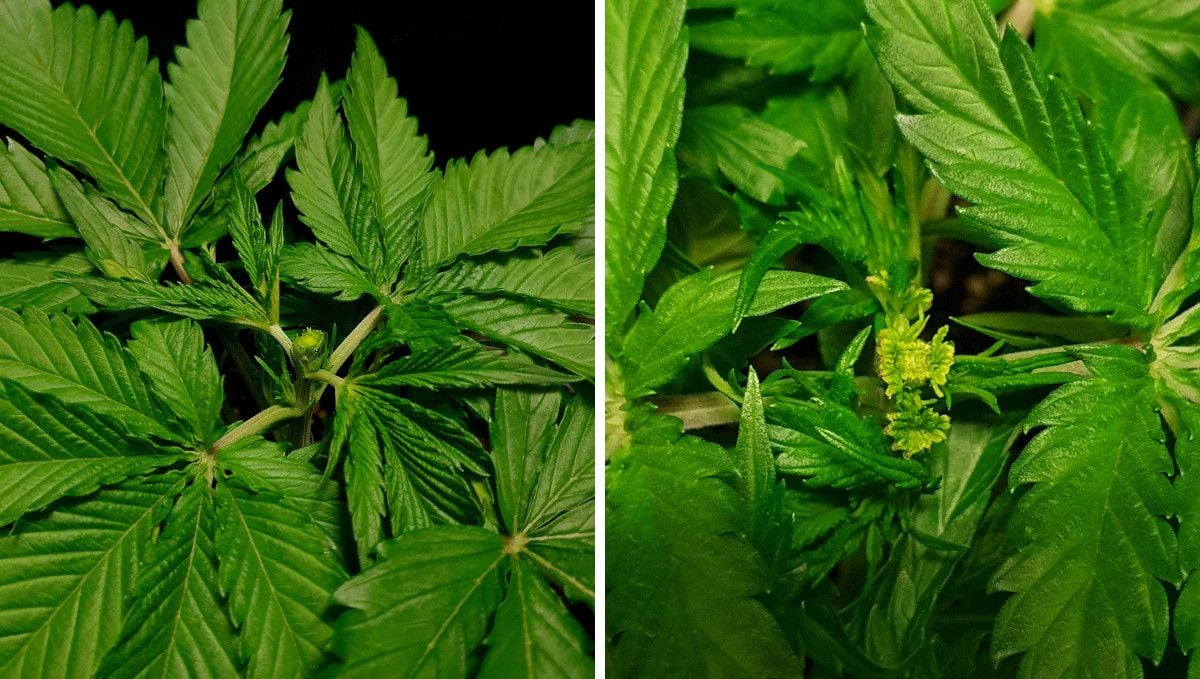
FIMed plants benefit from subsequent training too, whether it's ScrOG or some other form of Low-Stress Training (LST).
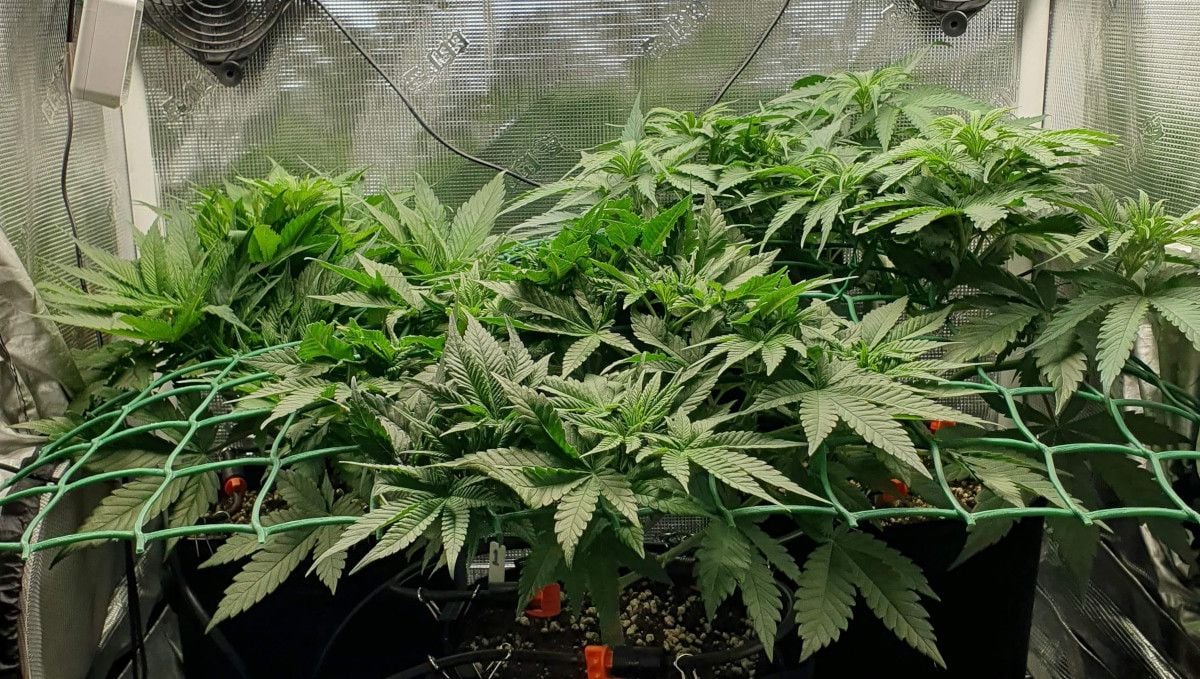
6. Transition (Pre-Flower) | Week 7
When dealing with photoperiod strains, such as Tropicana Cookies Fast Flowering, don't forget that initiating the flowering is up to you. When you've decided the plant is big enough for your setup, flip your timer to 12/12 and don't let any light leaks interrupt 12 hours of complete darkness. The rest of conditions may stay the same they have been before, although a slight drop in temperature and relative humidity wuldn't hurt either.
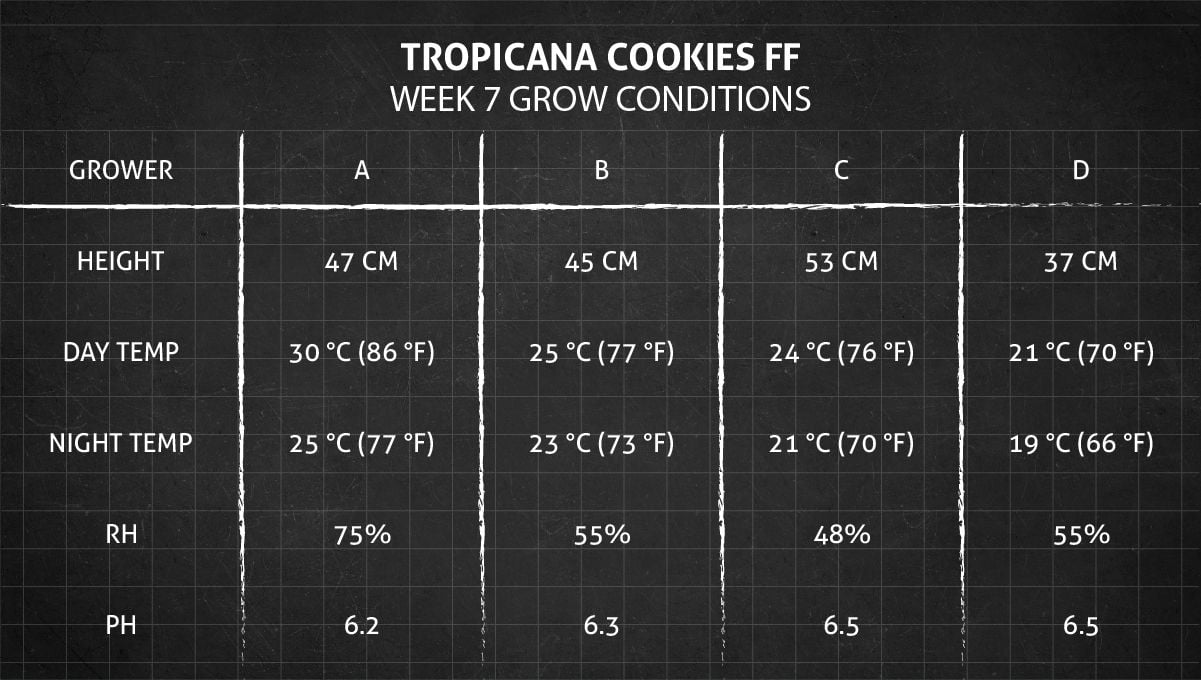
If vertical space isn't a concern, many growers prefer allowing their plants to mature before initiating flowering. A key indicator for this transition is the appearance of alternating nodes. Instead of leaves growing in pairs, they now follow a pattern where each new leaf emerges higher on the branch than its predecessor.
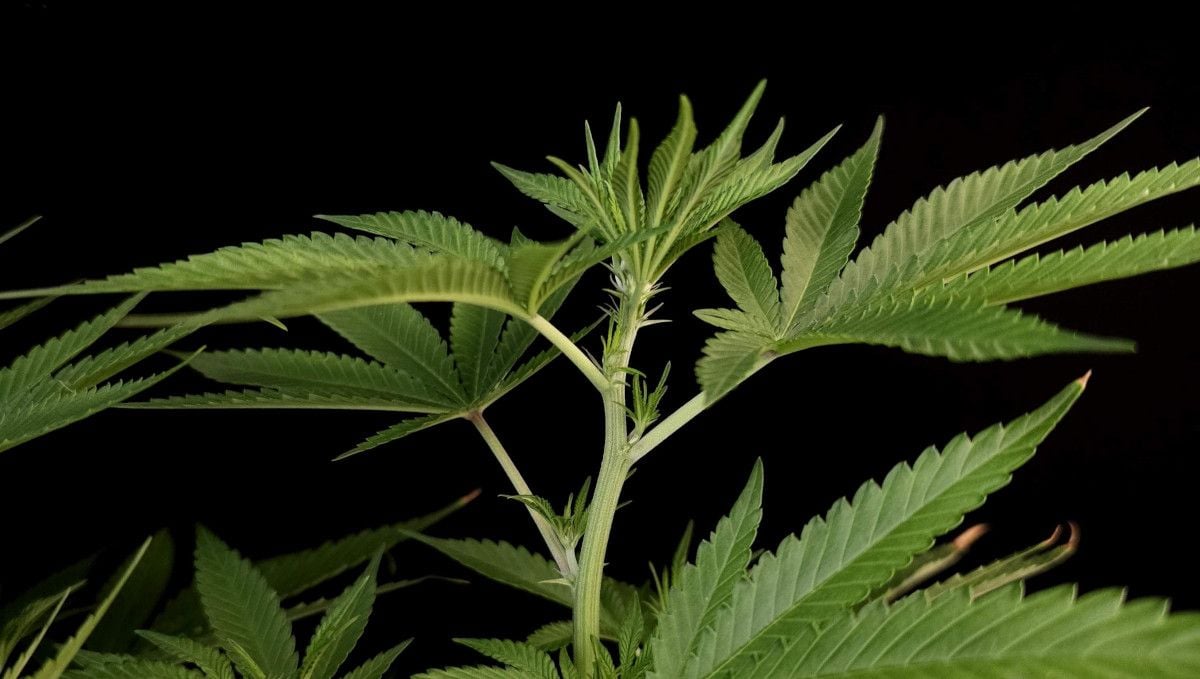
A clear sign that your plant is gearing up for flowering is the transformation in color at the top. The plant's upper sections become lighter green or even take on a yellowish hue. The shape of the new leaves also evolves, becoming narrow and giving the tops a distinctive bristly appearance.
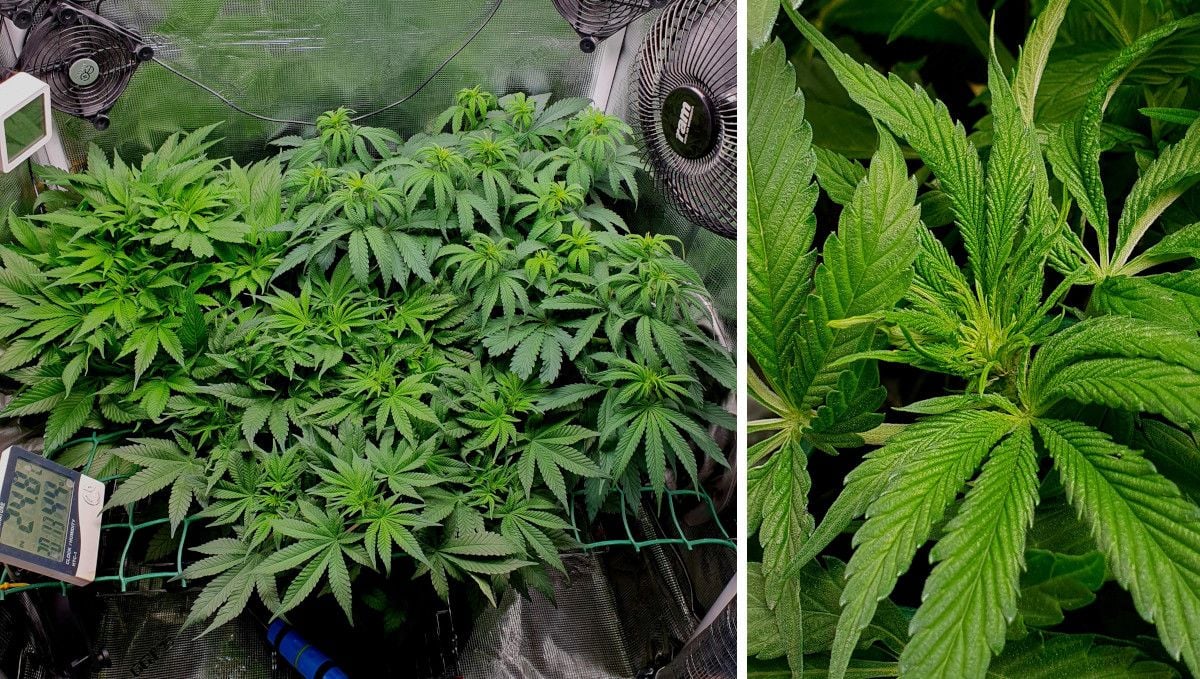
In the next few days to a couple of weeks into flowering, you'll witness the emergence of fluffy tops. Take a closer look, and you'll notice the thin leaves and even finer hairs known as pistils. These hairlike structures are exclusive to female flowers, signaling that your plant is officially in flower mode, and indeed, it's a girl.
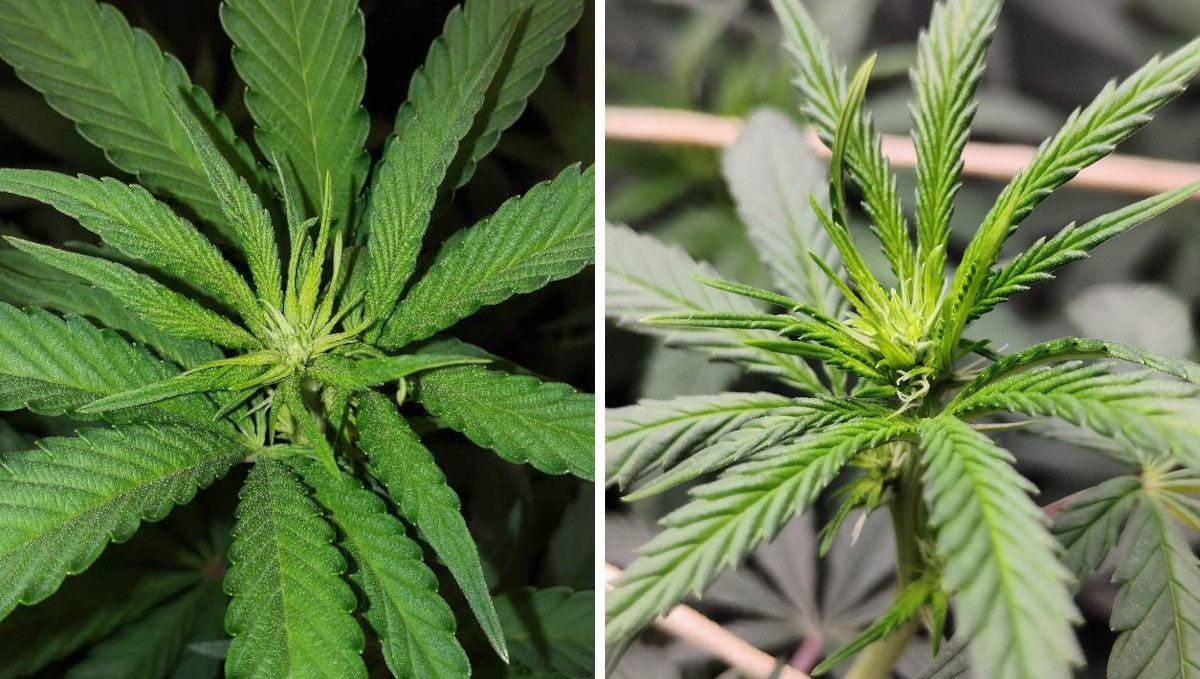
For those employing ScrOG, a shift occurs when the plant begins to bloom. Cease tucking the tops under the net and allow the future colas to stretch above and into the light, even if the entire net area hasn't been filled.
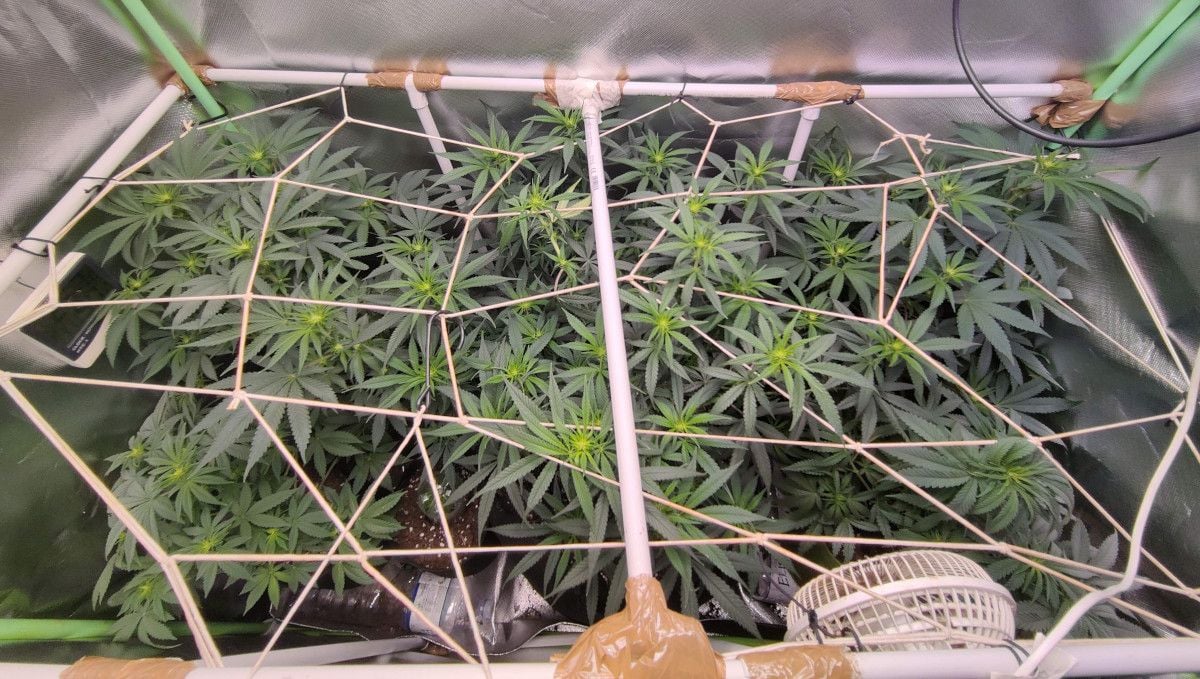
Many strains kick off their flowering journey by extending branches rather than immediate flower formation. This stretch can be intimidating, so timing is critical for photoperiod plants. Initiate flowering when they're not too large, ensuring they won't outgrow the available headspace in the coming weeks.

7. Early Flower | Weeks 8-9
The start of flowering should mark a gradual decrease in relative humidity. While the normal RH range for cannabis is 40-60%, you should aim at its upper limit in the vegetative stage and at its lower limit during flowering. You may also emulate the end-of-summer weather with a 1-2-degree drop in both day and night temps.
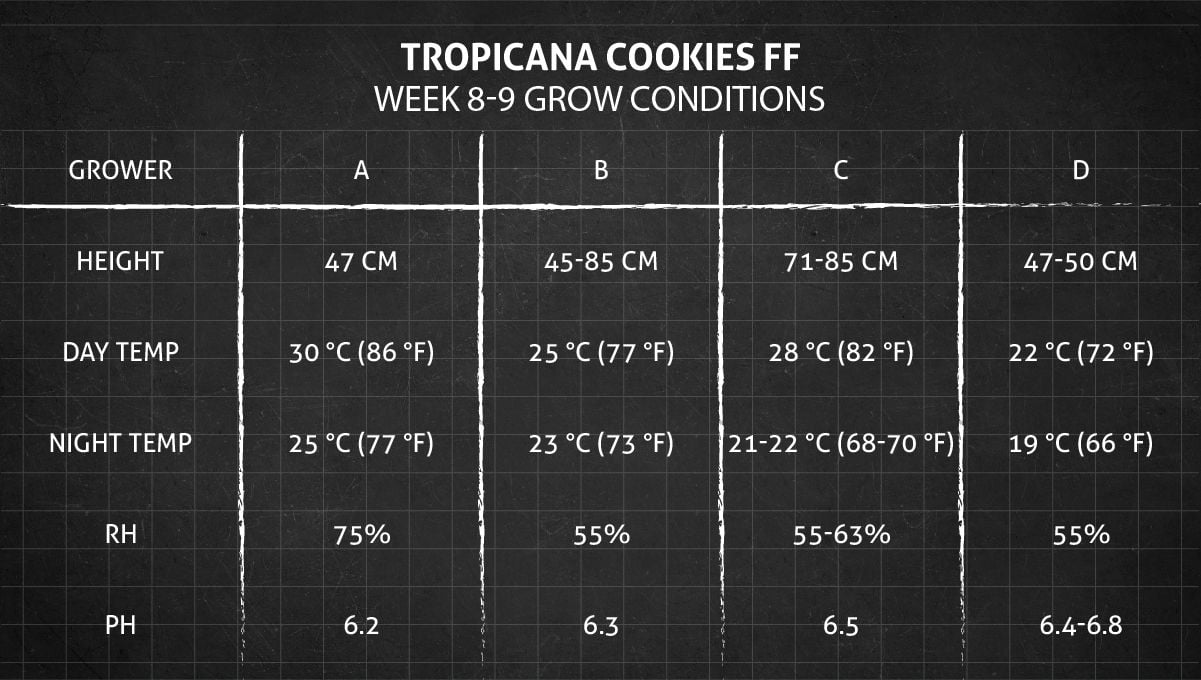
As your cannabis venture enters the flowering stage, the spotlight surprisingly isn't on the immediate development of flowers. During the initial weeks, the blooms tend to stay small, as the plant channels most of its energy into extending branches. While new branches take a backseat, the older ones stretch, transforming the plant into a size 2 or 3 times larger than its pre-flowering state.
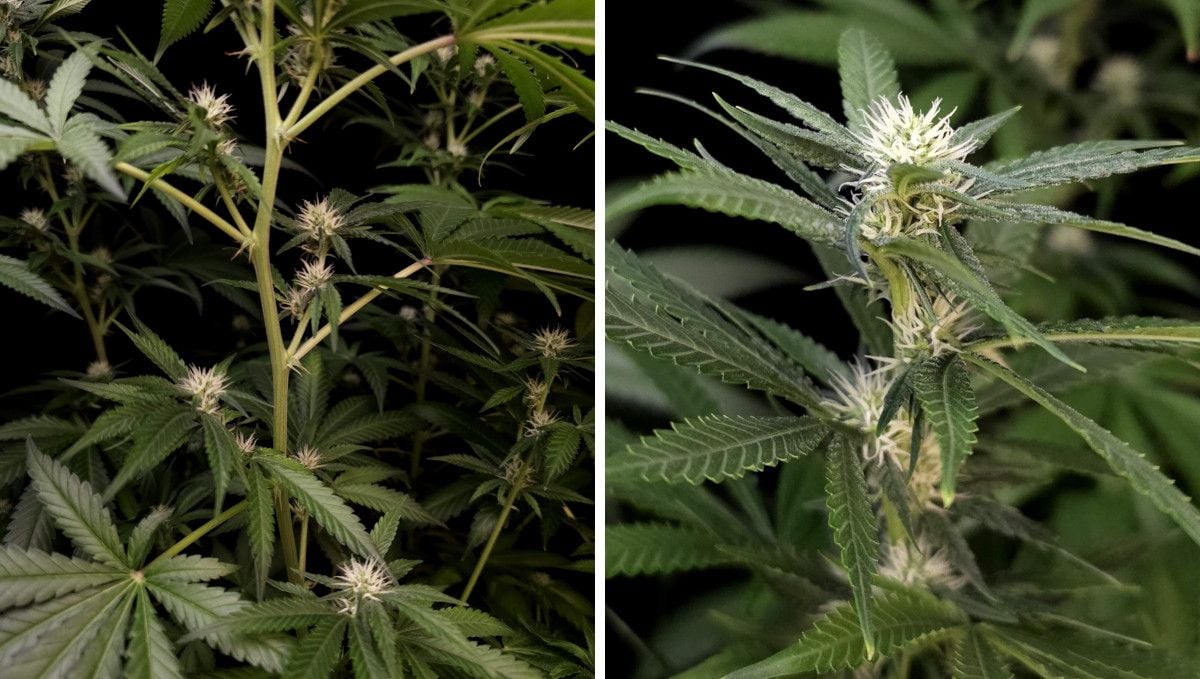
For ScrOG setups, it's time to ease off the training. No more tucking leaves and branches under the net – let those colas rise above the screen. Anything lingering below the mesh, including bud sites and foliage, should be removed. This not only prevents shading but also enhances airflow, minimizing the risk of mold in the lower part of the plant.
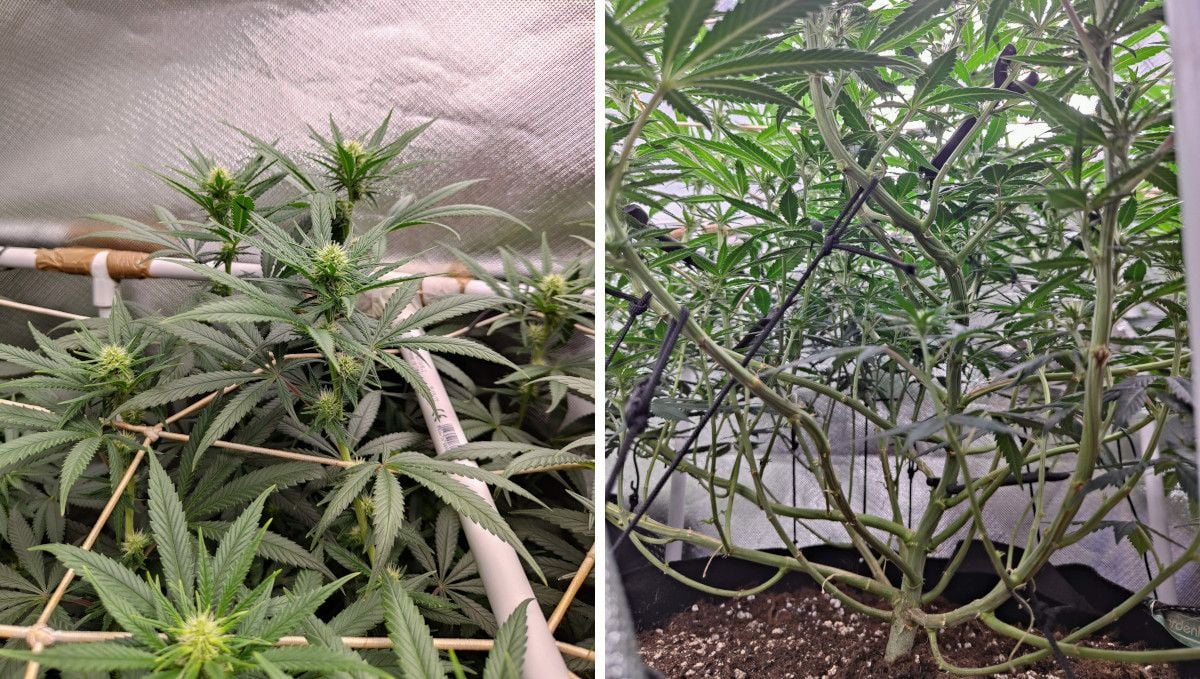
The flowering stretch can lead to towering plants, emphasizing the need for potent lights that penetrate every nook and cranny, ensuring robust bud development at every site.
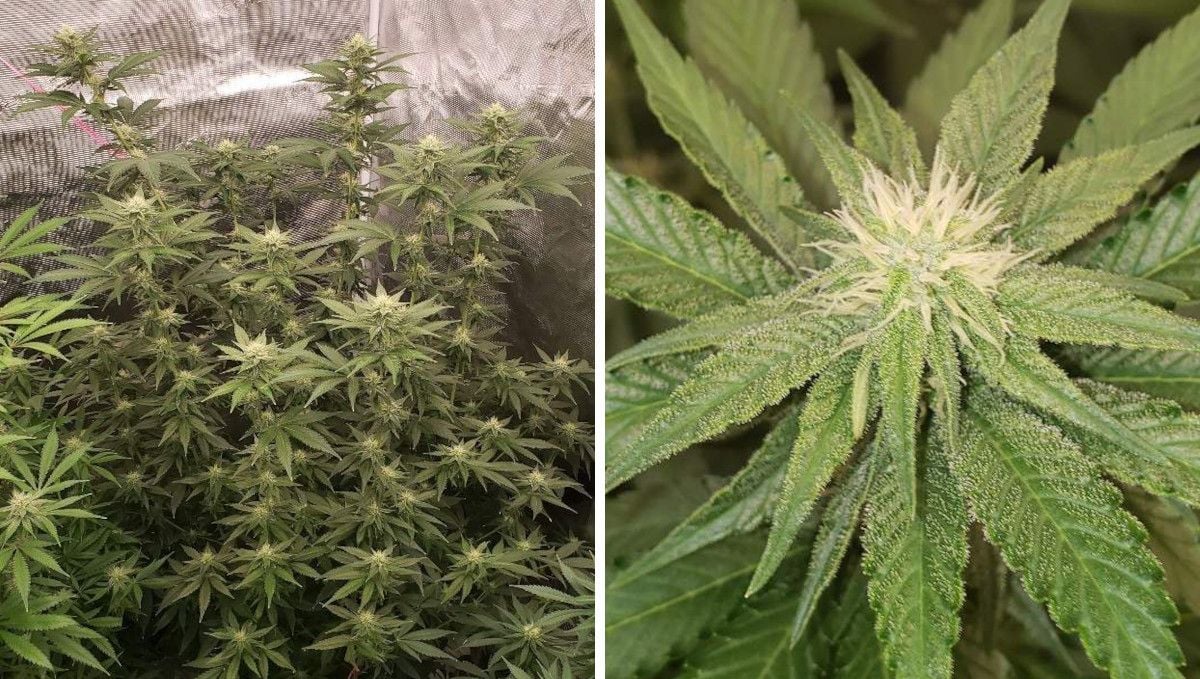
As branches stretch and flowers form, consistent and ample feeding becomes crucial to meet the plant's escalating demands. Adjust the diet to products suitable for budding plants, rich in phosphorus (P) and potassium (K) while dialing down the nitrogen (N).
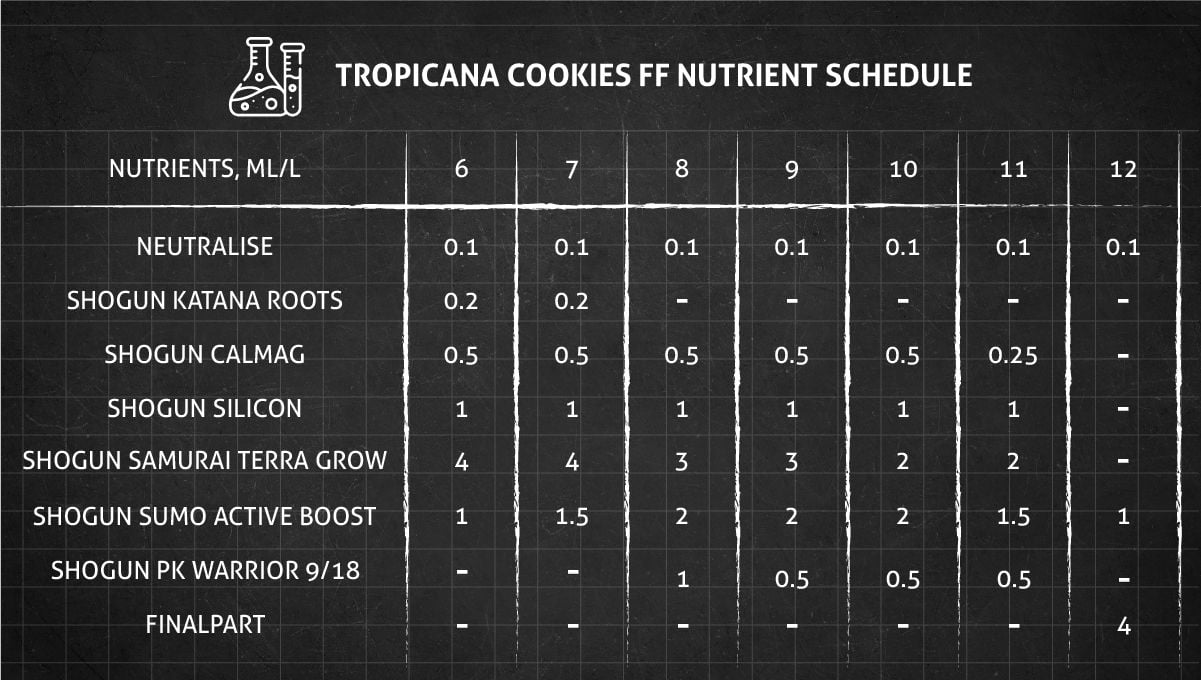
Even in the early flowering phase, resin-rich varieties like Tropicana Cookies FF start producing copious amounts of trichomes, the resin glands. These trichomes cover not just calyces but also adjacent trim leaves. They serve as repositories for THC, other cannabinoids, and aromatic terpenes. Brace yourself for an aromatic journey as your plants start emitting delightful scents, prompting the use of a carbon filter to manage the fragrance.
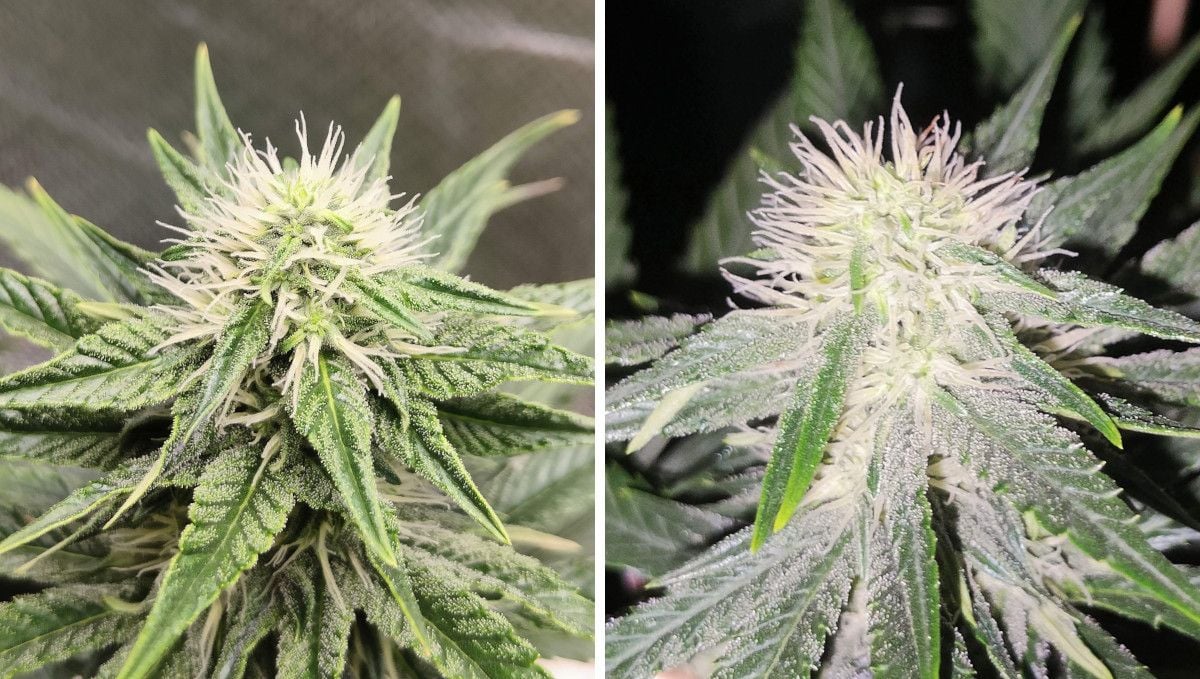
8. Mid Flower (Bulk Phase) | Weeks 10-11
The bigger the buds, the more vulnerable they are to fungal infections, so pay extra attention to keeping the relative humidity around 35-40% (to be on the safe side). We haven't commented yet on such an important parameter as pH. pH in water affects the efficiency of nutrient absorbtion by plants' roots and should be within 6.0-6.5 for soil grows. As different nutrients require slightly different levels, you may let pH fluctuate slightly within this range from one watering to the next.
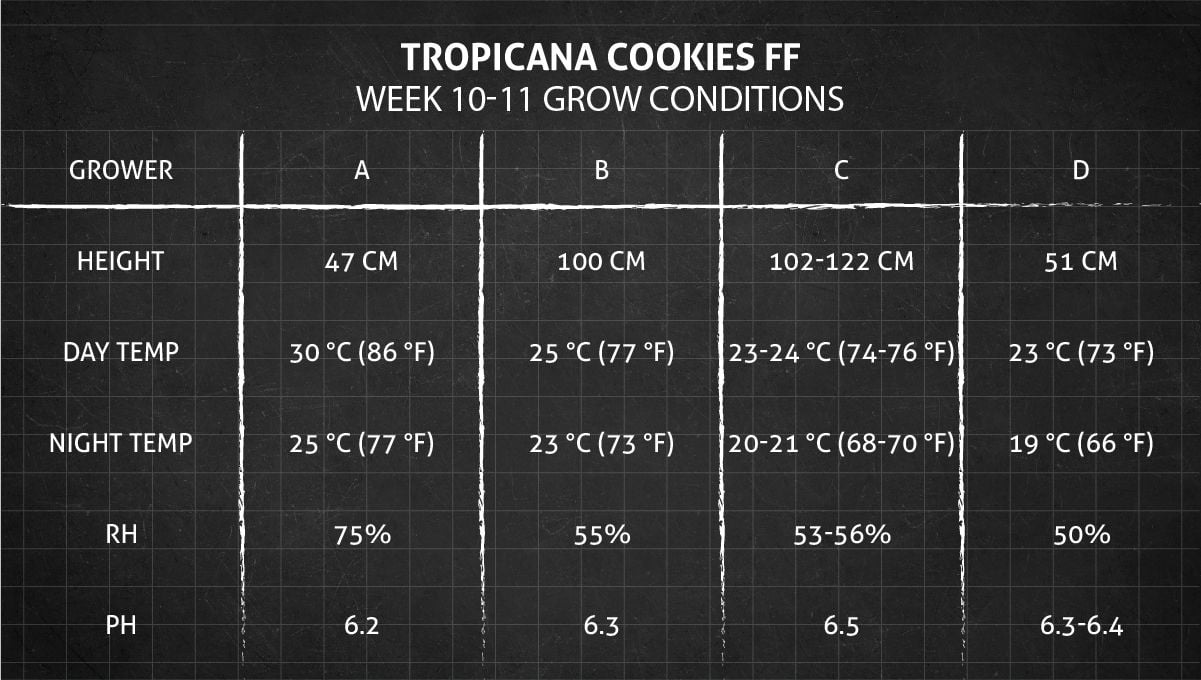
As the flowering journey progresses, the growth of branches gradually wanes, making way for the star of the show – the visible enlargement of flowers. This pivotal moment marks the realization for inexperienced growers that a generous, if not huge, yield is on the horizon. Despite their impressive size, the buds remain immature, evident from the persistent white color of the pistils covering the colas.
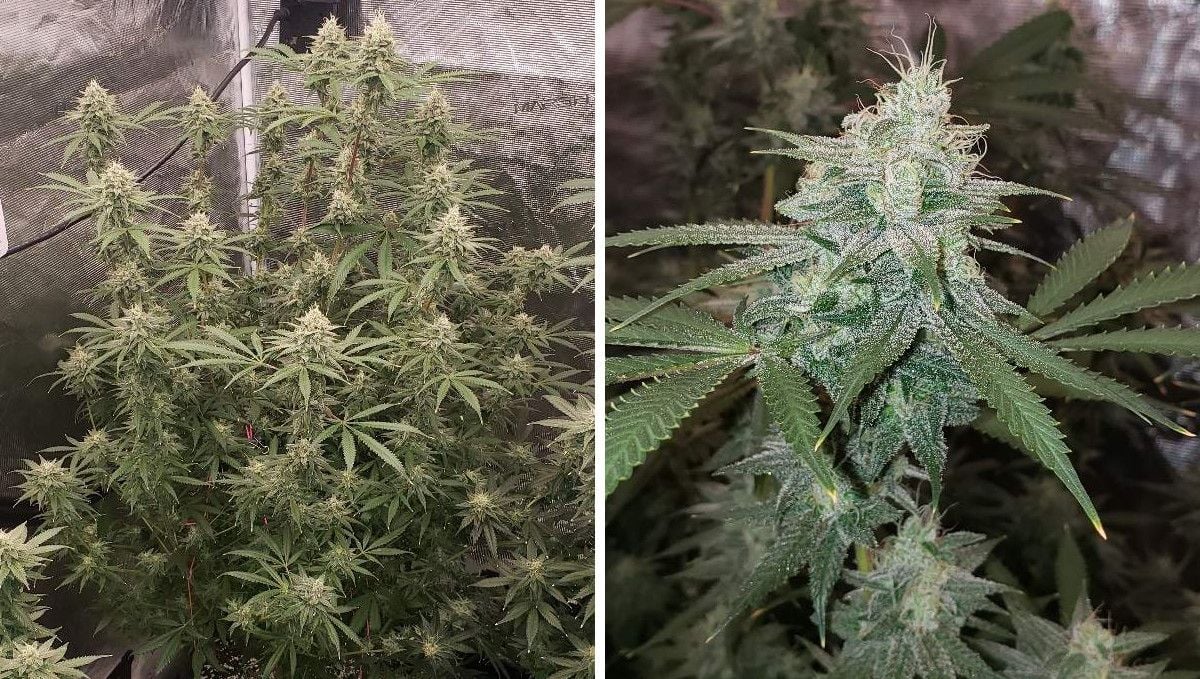
The plant's appetite for nutrients continues to surge, emphasizing the need to provide larger amounts than ever before. While nitrogen requirements decrease, it's crucial to maintain a balanced nutrient intake, as premature weaning from this essential macronutrient can lead to premature fading of leaves.
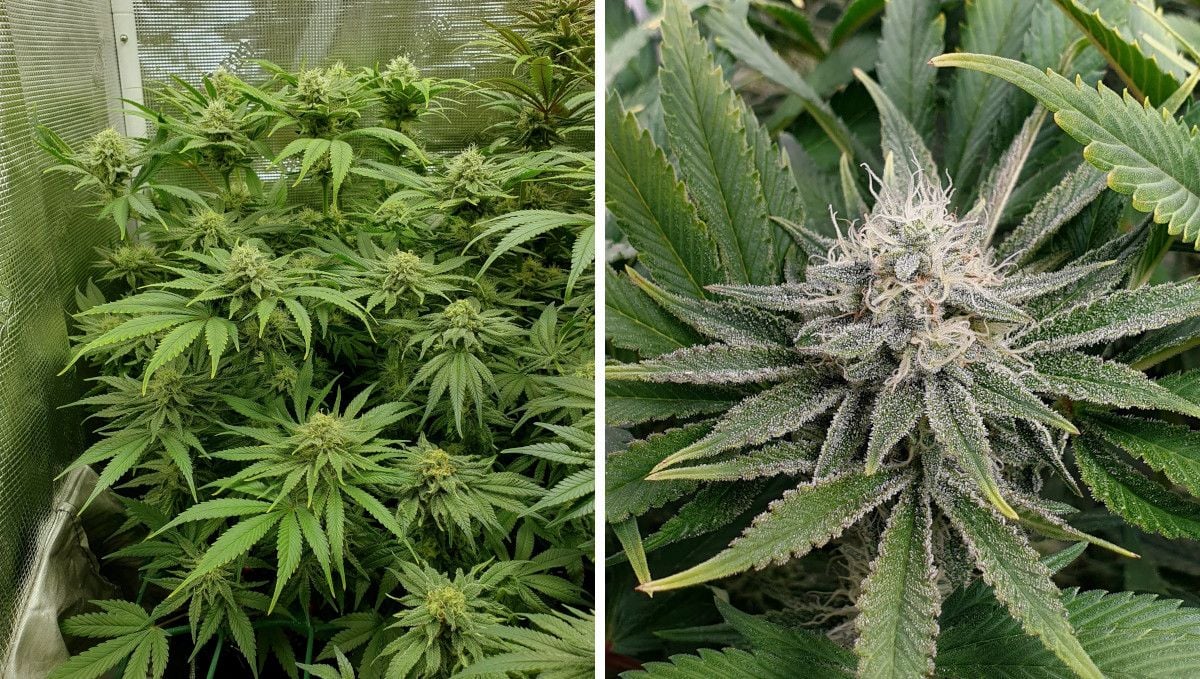
Beware of extremes – excessive nitrogen is as undesirable as its deficiency, potentially disrupting flower production. Strains exhibit varying nutrient appetites, so keen observation of their response to feeding is essential. Excessive nitrogen levels may manifest in excessively dark green foliage and slight clawing of the leaves.
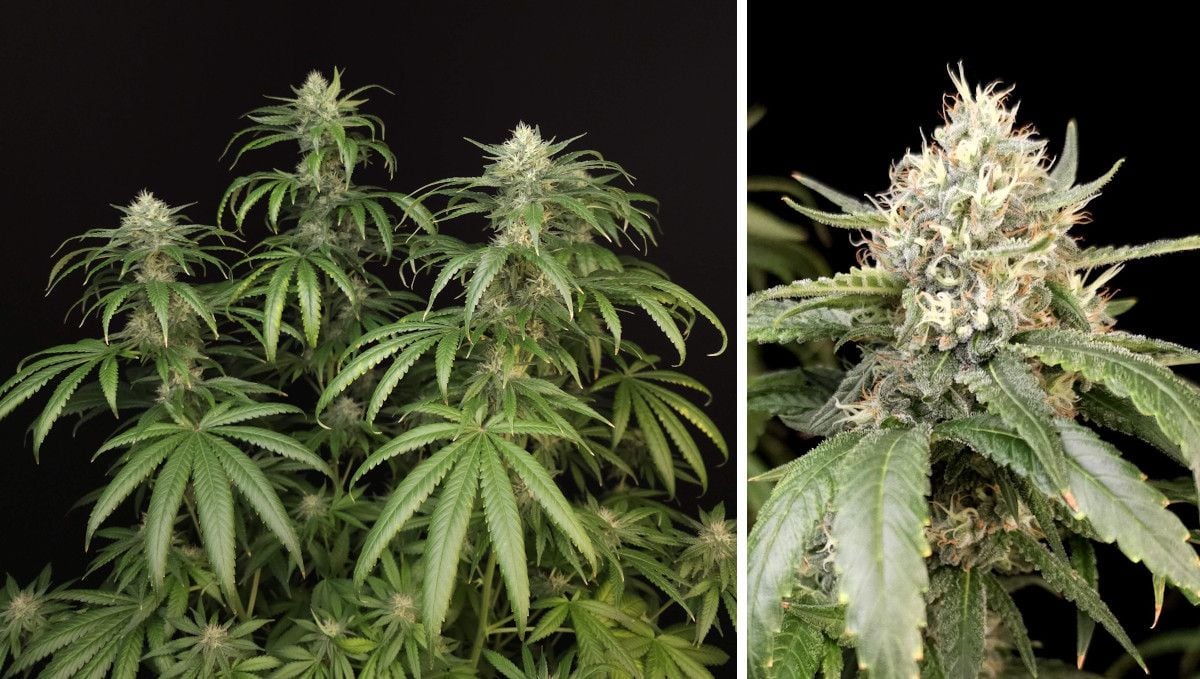
All the anxiety induced by the previous weeks' continuous stretch can be cast aside, as the plants cease their vertical growth around this time. The stage is set for the grand finale of bud development.
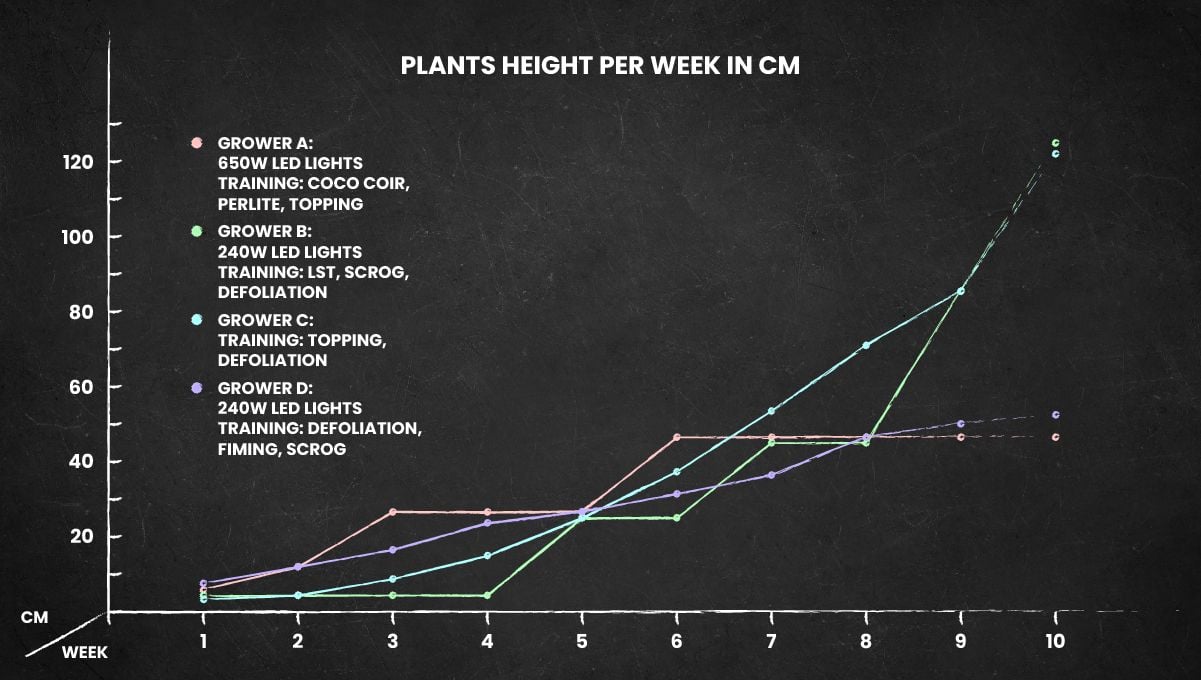
As this period concludes, the buds not only become remarkably bulky, but the leaves also adopt a faded autumnal look, signaling the imminent harvest. However, resist the temptation to harvest too soon, as the buds are generally still in their immature phase. This is evident from the small percentage of brown pistils among the predominantly white ones covering the buds.
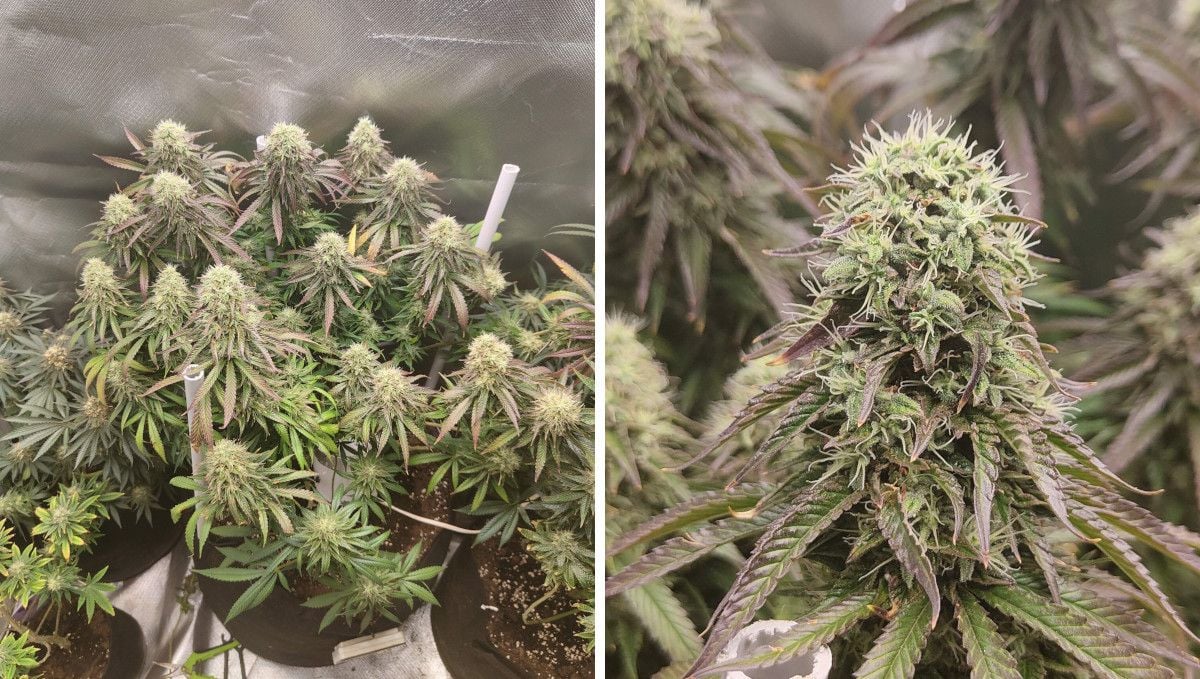
As the buds swell each day, don't overlook their voracious appetite for nutrients. Provide extra-large doses, particularly those rich in phosphorus and potassium (P and K). Consider extending the plant's diet with a standalone PK booster to give it a final push towards a record-breaking harvest. Your meticulous care is steering your cannabis garden towards a triumphant conclusion.
9. Ripening And Harvest | Week 12 (And Beyond)
As buds get denser and denser as the day of the harvest approaches, make it your priority to keep RH in check and regularly inspect the buds for signs of powdery mildew, mold, and bud rot. By decreasing the day temperature to 23°C or even slightly lower and not forgetting to keep things cooler at night, you can try and make your buds turn purple. Naturally, it will only work for those strains that are genetically predisposed (purple varieties).
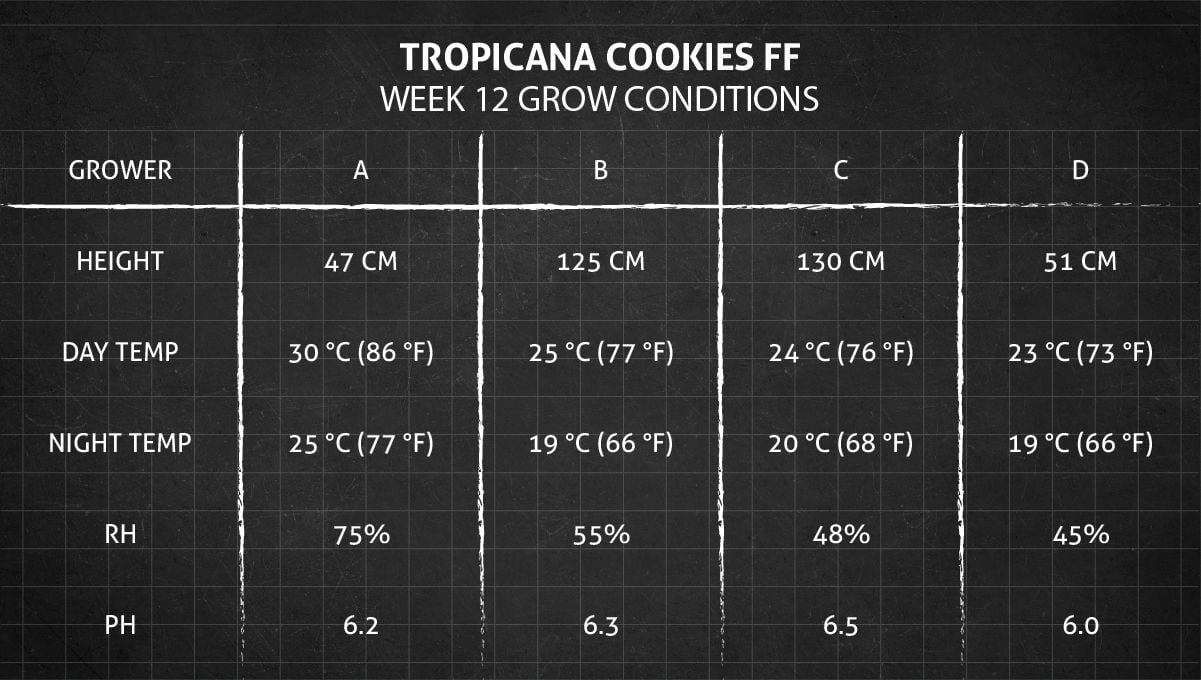
As your Tropicana Cookies FF grow cycle nears its culmination, it's crucial to understand that buds don't stop evolving until the harvest day. Despite reaching a visible size limit a couple of weeks before that, they continue to densify and gain weight, contributing not only to a higher yield but also to enhanced quality. The flowers store an increasing amount of psychoactive and aromatic substances, elevating their overall potency.
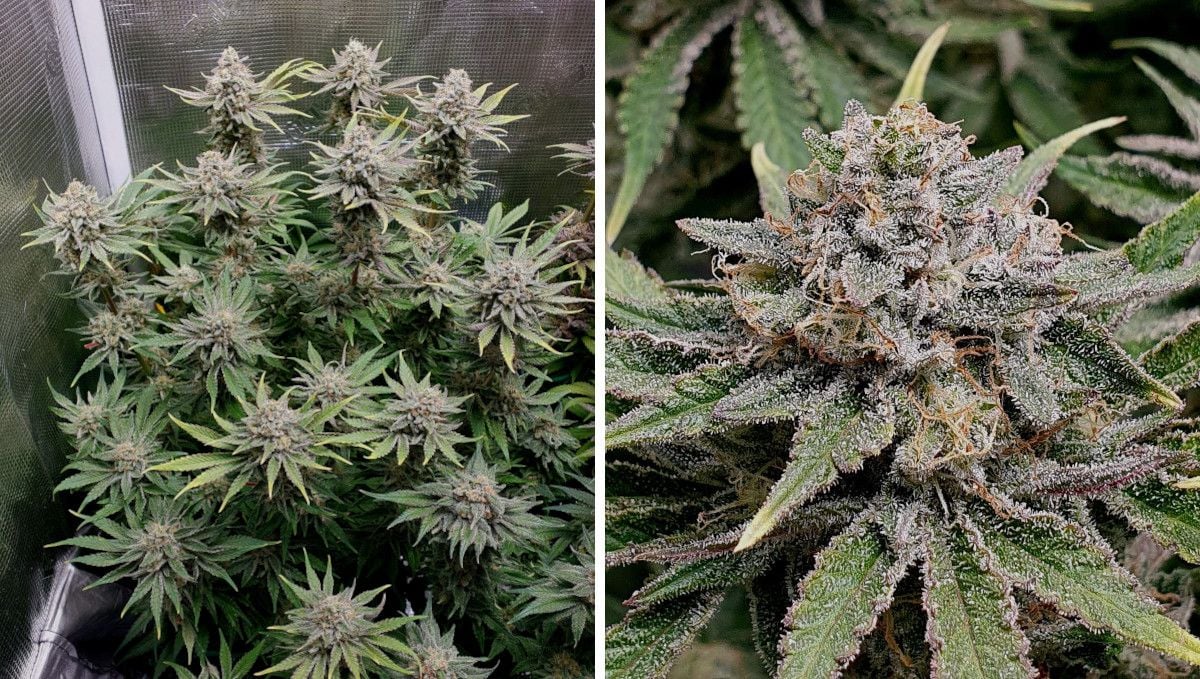
Growers acquainted with both indoor and outdoor cultivation recognize the stark differences in the appearance of buds. Indoor cultivation tends to yield larger, fuller, and denser buds, while outdoor-grown flowers may have more leaves, demanding additional time and effort during post-harvest trimming.
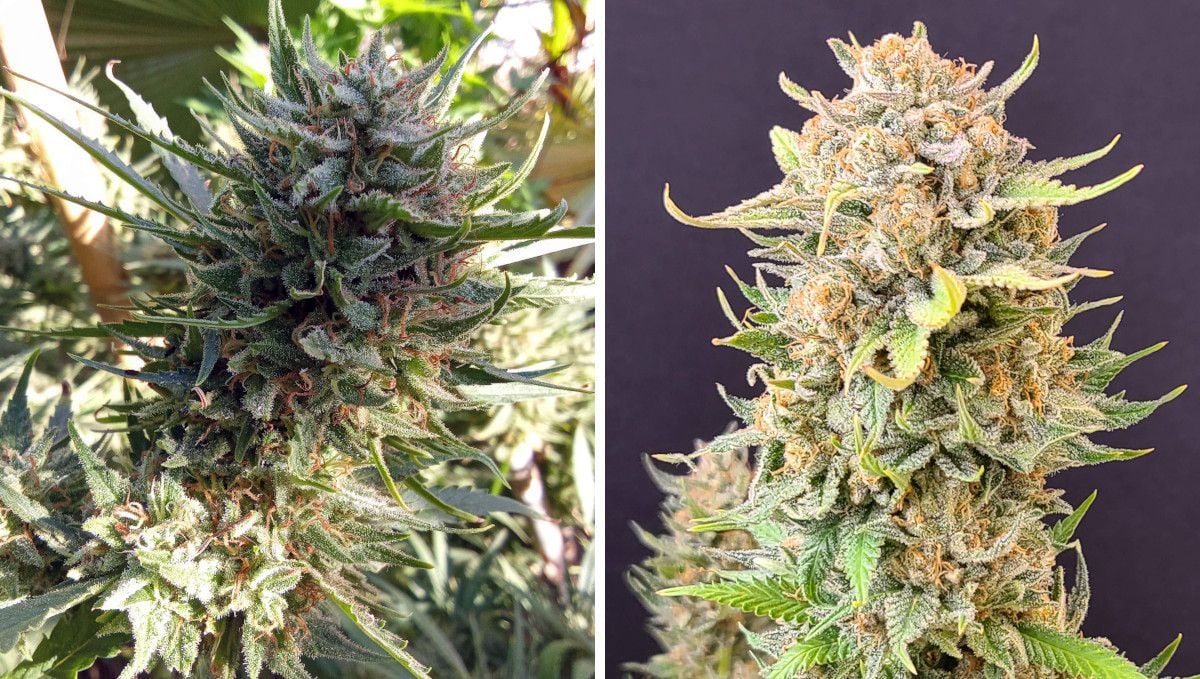
While general indicators can hint at an approaching harvest, the most reliable method involves inspecting trichomes under a 60x hand microscope. Monitor the transition from clear to cloudy, indicating the peak THC levels. Avoid letting too many trichomes turn amber, signaling the onset of THC degradation to cannabinol, which has more sedative properties.
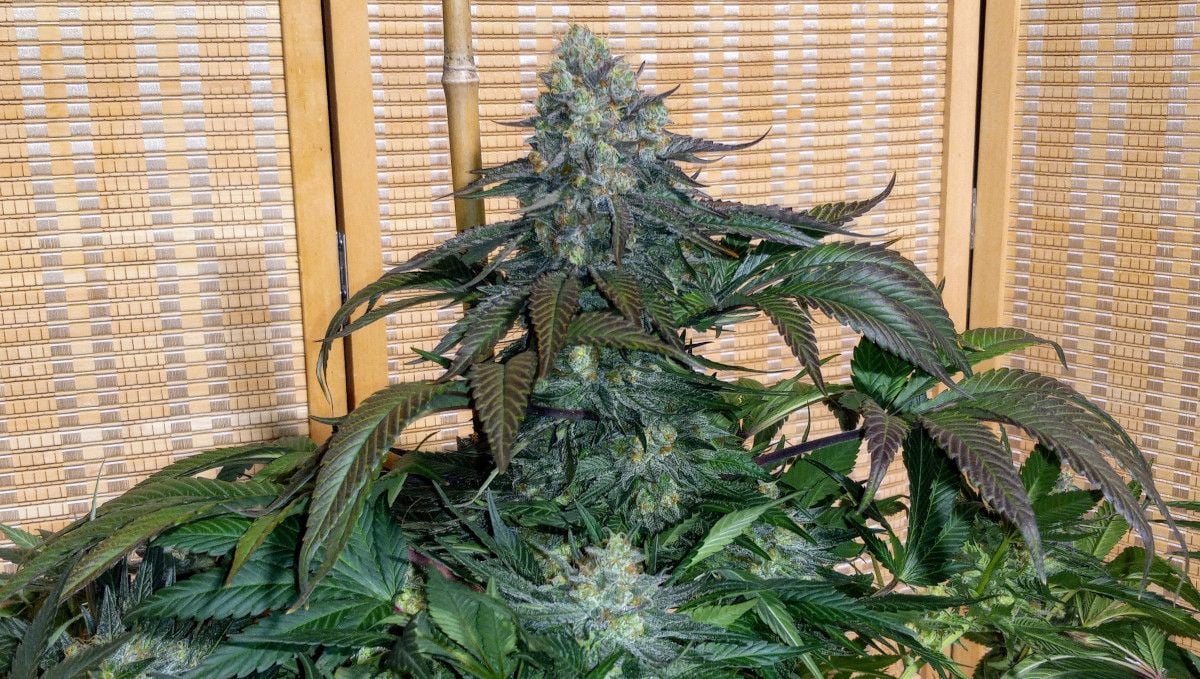
Adding complexity to the timing challenge is the need to anticipate the harvest 1-2 weeks in advance. This period allows for a final flush to cleanse the medium and plant tissues of accumulated salts. Hydroponic and coco coir setups require a week of pure water, while soil grows may need up to two weeks. This flushing process ensures a cleaner and tastier smoke, devoid of harmful chemical residues.
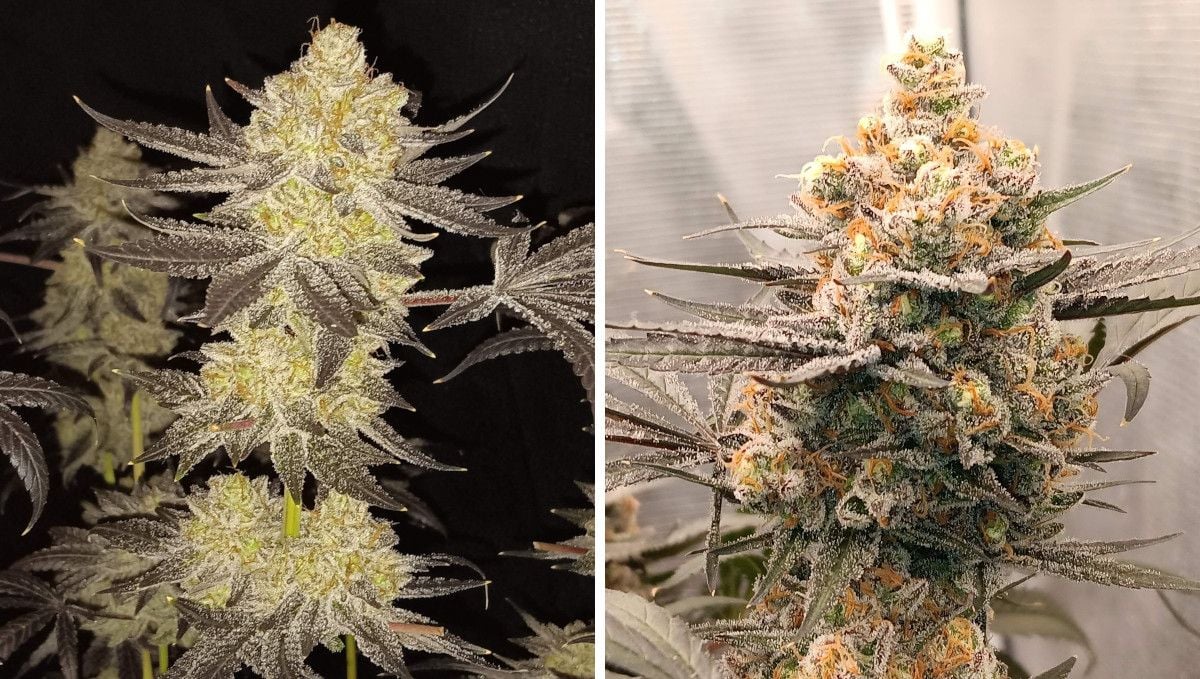
Experienced growers employ subtle tricks to elevate the final product's quality further. One such technique involves subjecting the plant to total darkness for up to 48 hours before harvest, purportedly inducing the production of more potent compounds.

The quest for top-notch bud quality doesn't conclude with harvest. Proper drying and curing for a minimum of 2-3 weeks are equally vital. This phase extends beyond mere moisture removal, encompassing chemical processes within the flowers that transform sugars, starches, and chlorophyll – all of which contribute an unpleasant taste to smoke – into elements conducive to an enhanced smoking experience.
10. The Outcome
In the table below, you will find the results of the 4 Tropicana Cookies FF grows we've been following along with some setup details. As you can see, the strain delivered regardless of the conditions.
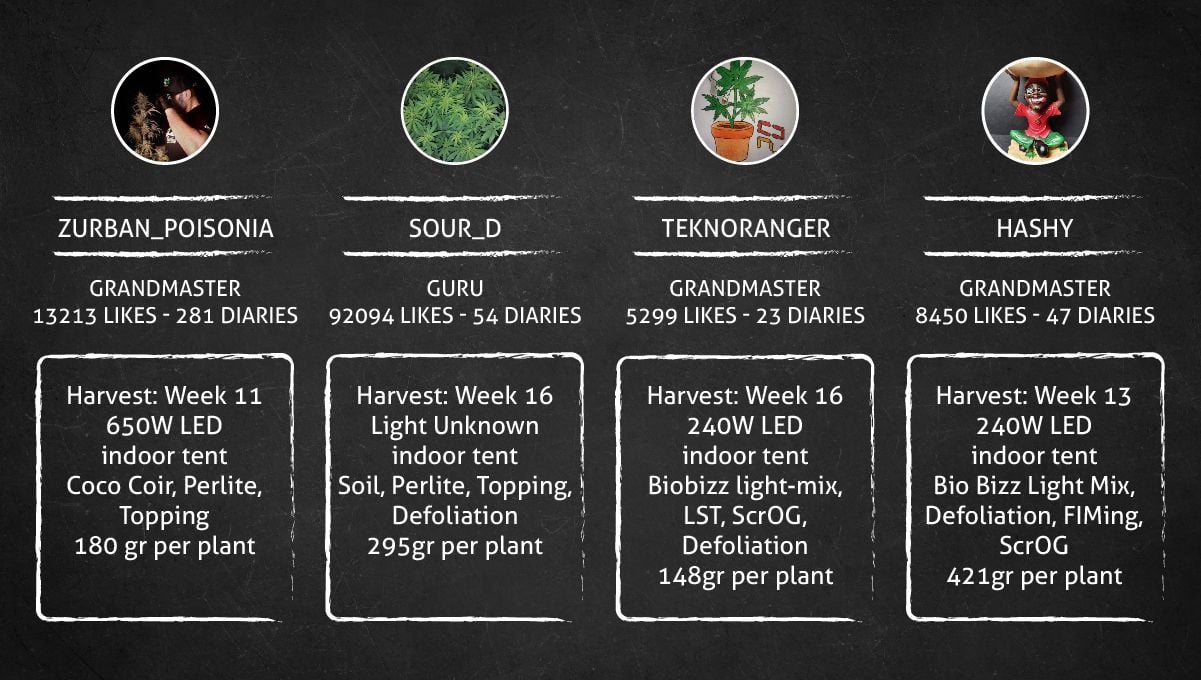
Tropicana Cookies FF Yield
The first gardener in our review (Grower A) got a tall plant with four sizeable main colas and a huge number of smaller buds covering secondary branches and the lower portion of the plant. Collectively, they weighed 180g (6.35 oz) when dried and cured.
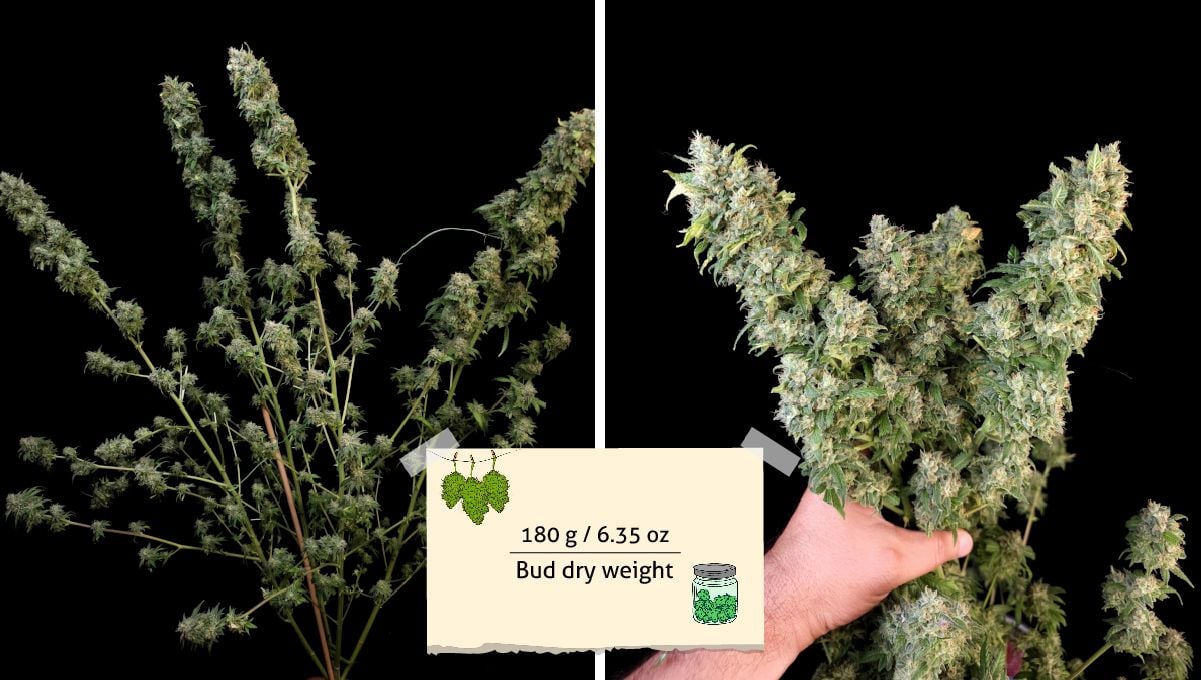
Grower B's plant looked no less spectacular, although quite different, and the final result was 148g (5.22 oz).
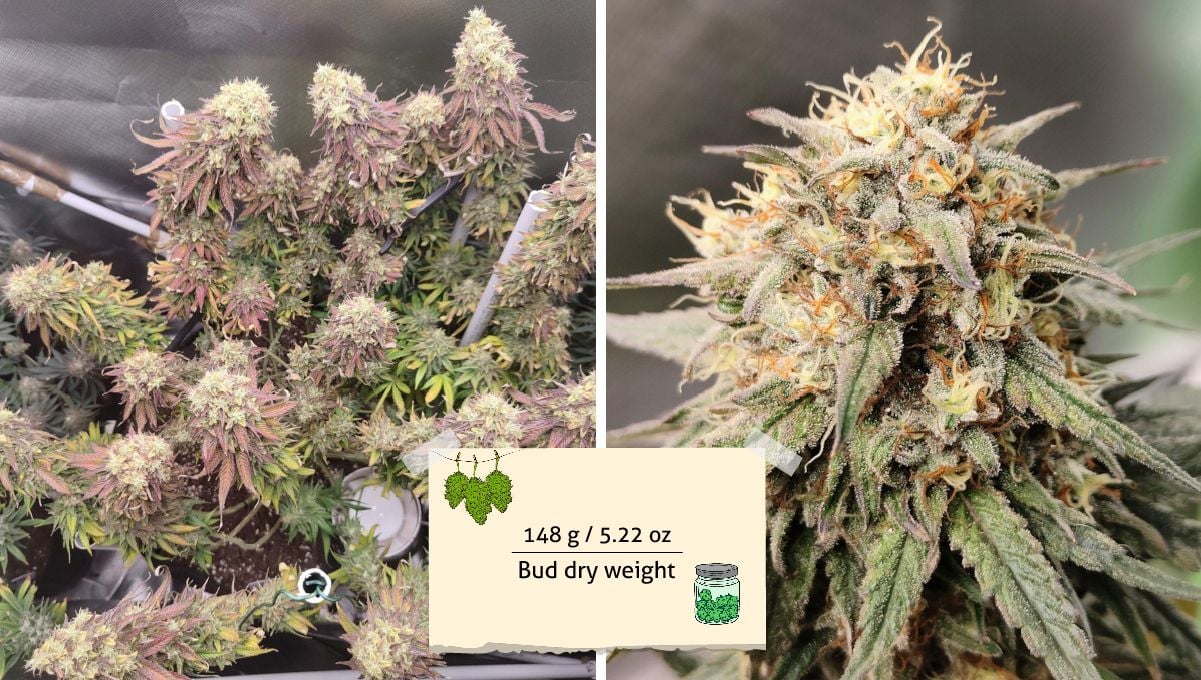
Grower C's result were even more incredible – 295g (10.4 oz) of closely trimmed dry buds.
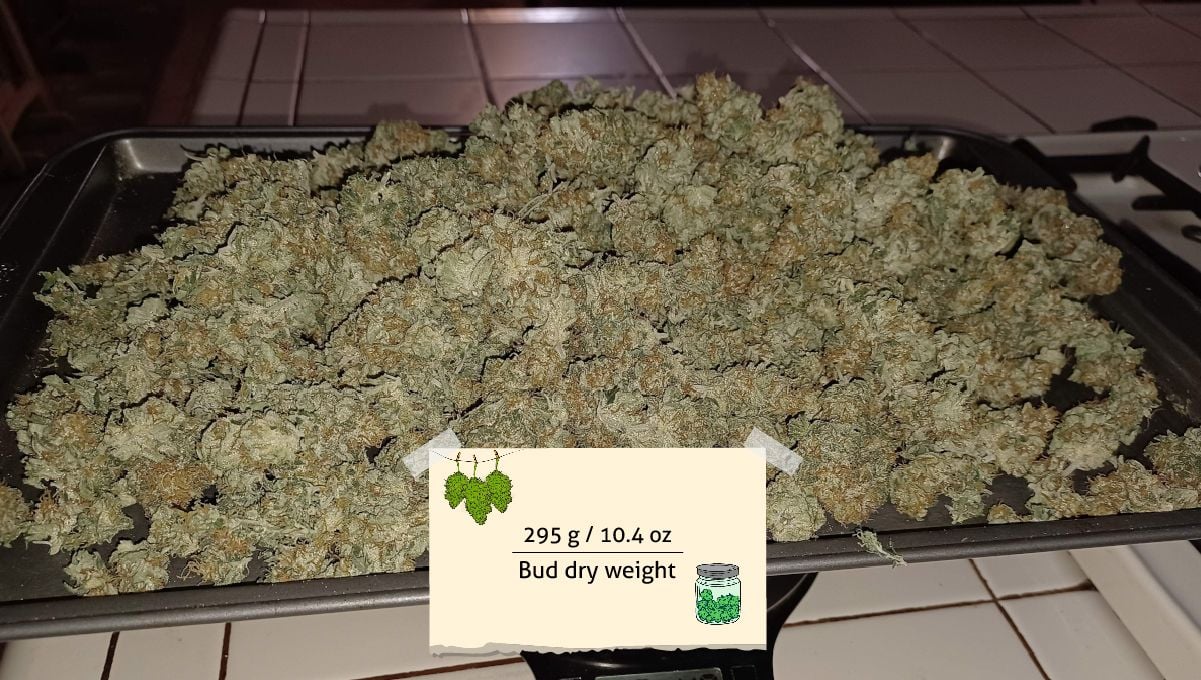
Grower D's buds were equally top-notch in quality – firm, dense, and as resinous as one could hope for. He harvested 421g (14.85 oz) of wet bud from his Tropicana Cookies FF plant.
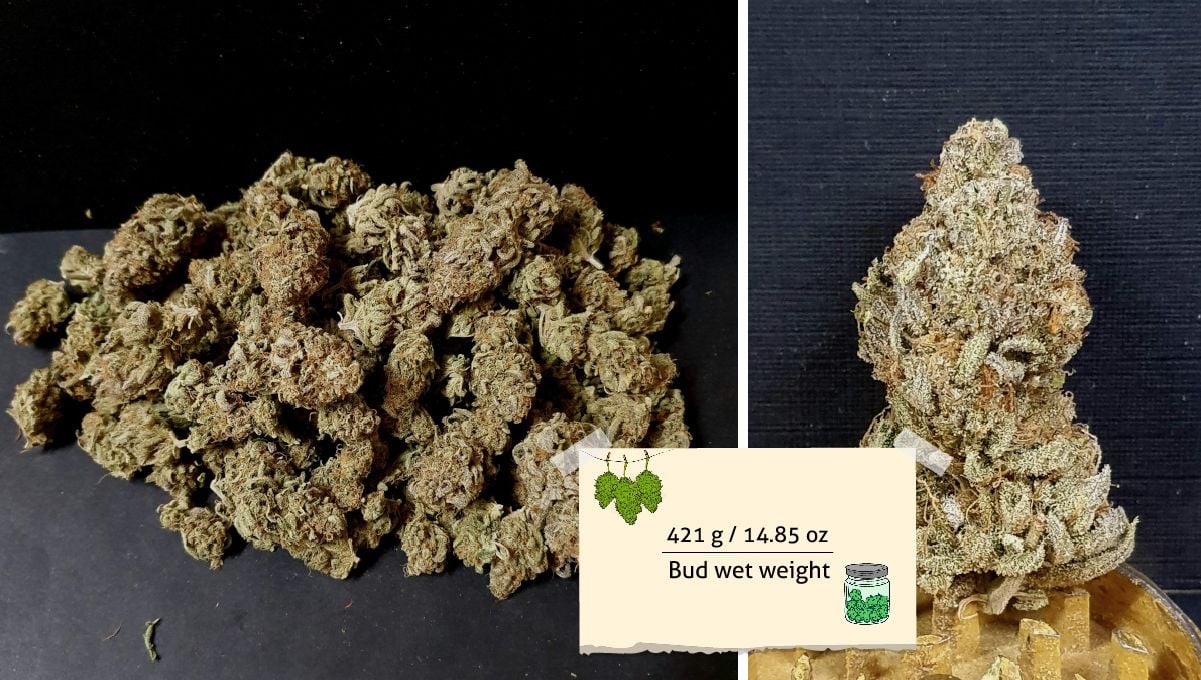
Tropicana Cookies FF Smoke Report
Smokers across the board rave about Tropicana Cookies FF's knockout punch of potency and exceptional flavor profile. The dense, sticky buds release a super dank smoke with a delightful combination of sweet and old-school dank notes. Users report canceling plans when enjoying this strain during the day, as its effects are powerful and long-lasting. With a nice buzz and excellent flavor, it's deemed the "real deal." Tropicana Cookies FF seems tailor-made for those seeking a potent, flavorful, and nostalgic smoking experience, making it an ideal choice for relaxation, whether during the day or for special occasions.

11. In Conclusion
The four grows we've analized in our week-by-week guide show Tropicana Cookies FF to be a versatile plant that adapts easily to growers' personal styles of cultivation. Two of them chose to let their plants grow freely, and they became quite tall and insanely bushy. The latter tendency was enhanced by topping in one case, but in the other, the untopped plant also had a great number of branches with sizeable colas on all of them.
The other two growers preferred to keep things low profile and curb the plants' heights with aggressive training. Tropicana Cookies FF was compliant with this approach and stayed compact and squat but produced good yields nonetheless.
The duration of flowering was indeed as short as one would expect – on par with average autoflowers. If the overall cycle was longer than in autos, it was mostly becasue the growers preferred to give their ladies a longer veg – to increase their size and the eventual yield.
Tropicana Cookies FF also proved a very resinous strain – with a lot of frosty trim that was quite smokable and could be used as a source material for first-rate concentrates.
All in all, this fast flowering variety is something you'd definitely want to cultivate and savor. Happy growing, everyone!
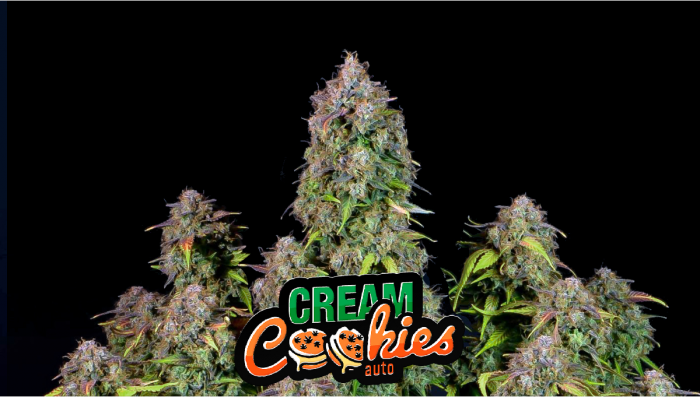













Comments